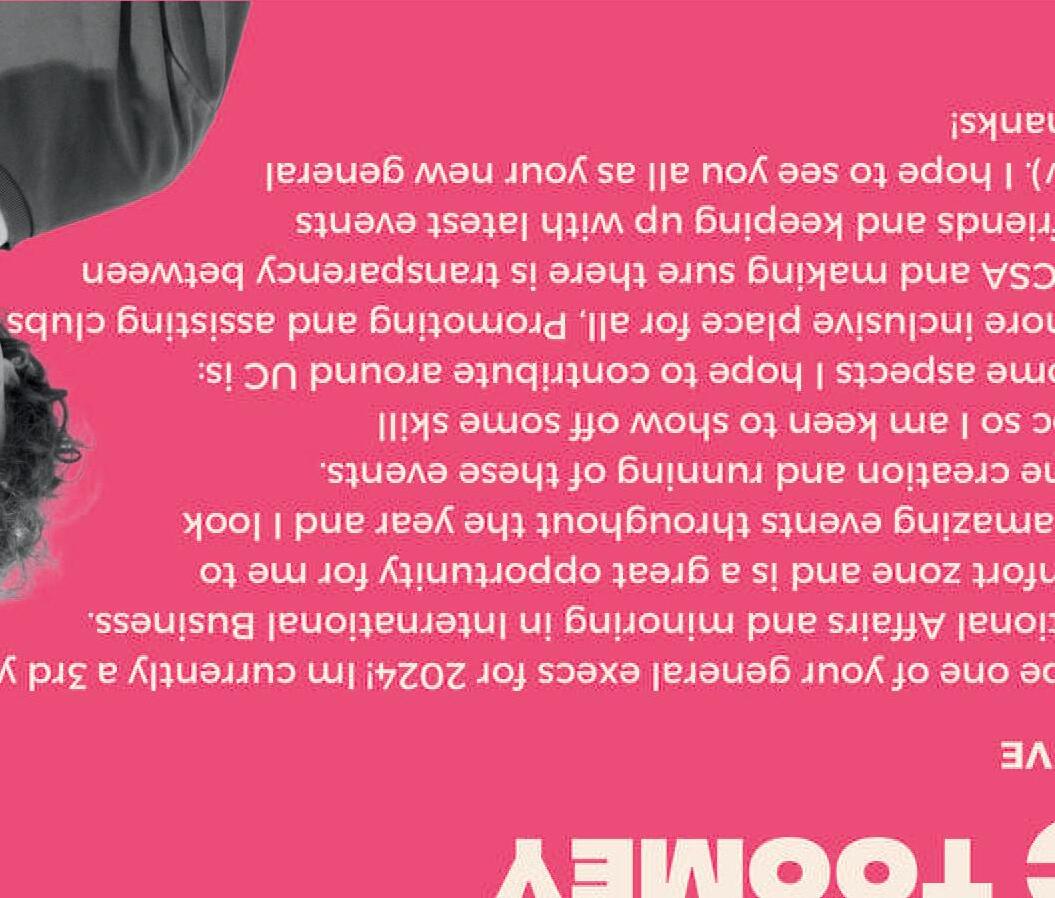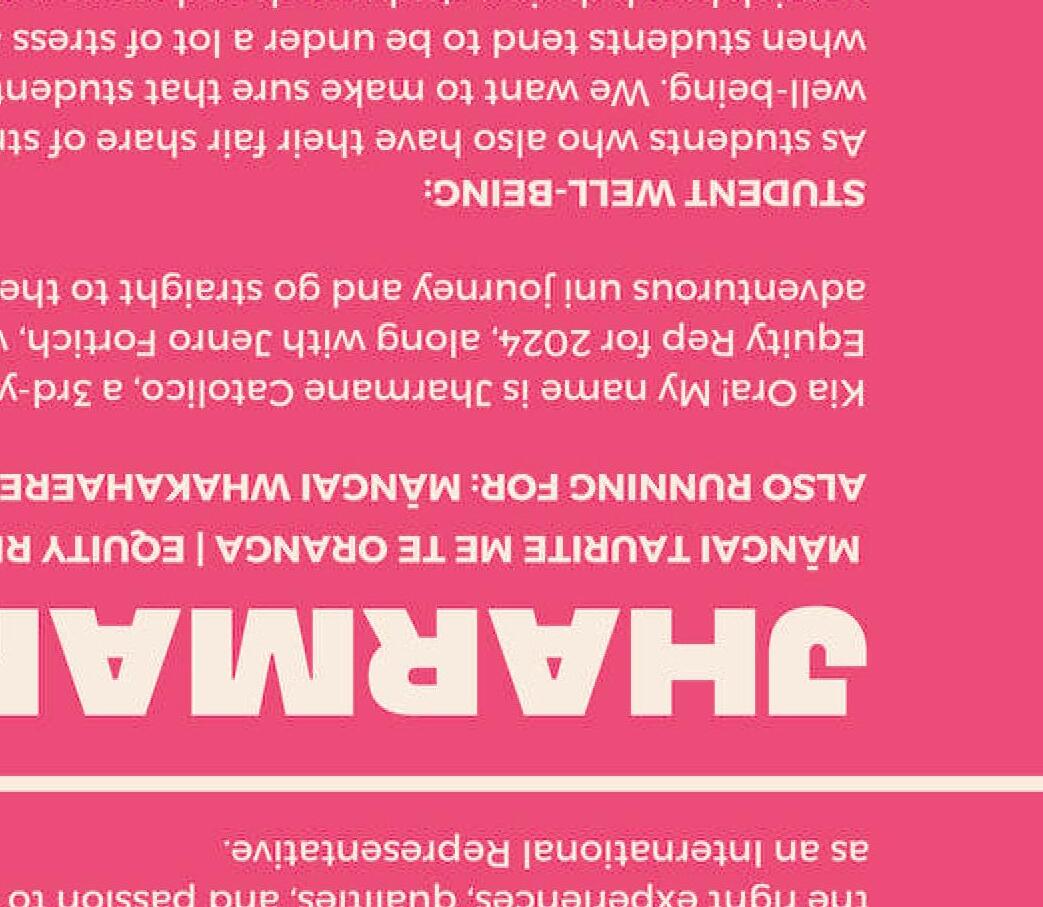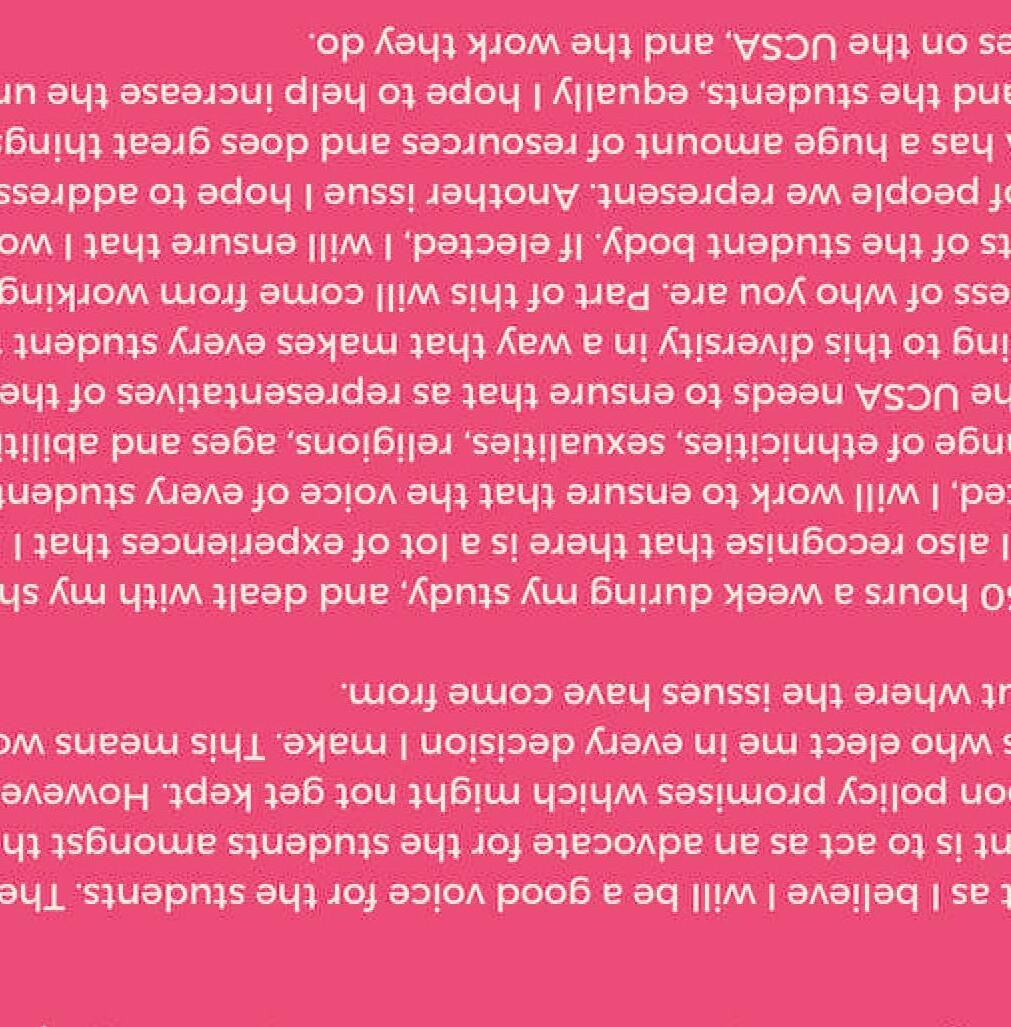CANTA





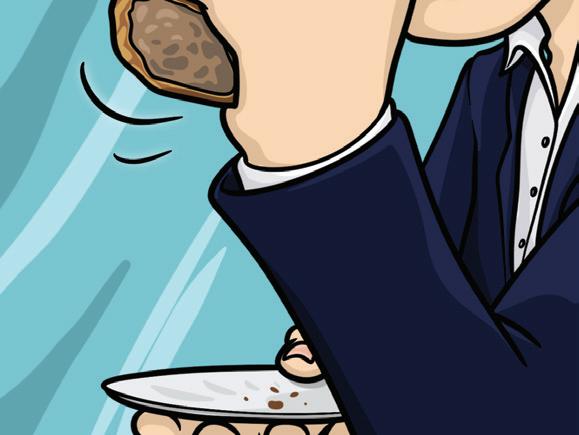




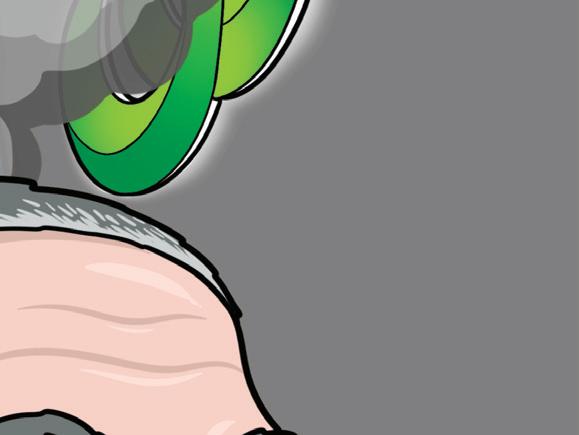








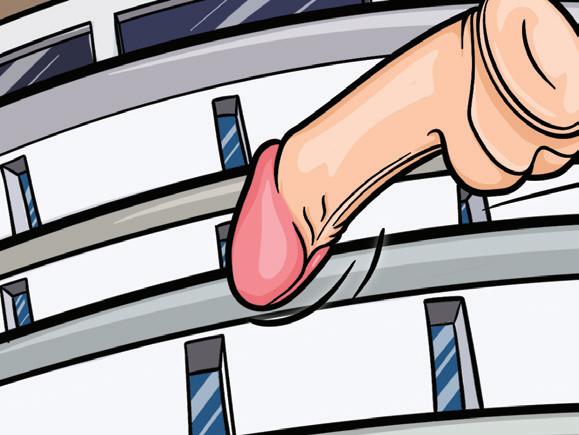










































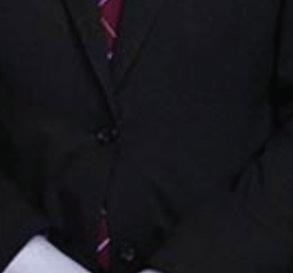





Last edition of Canta was insane. We completely ran out of mags, had to restock twice within two days and our socials were going crazy. I know a fark ton of you all have the centrefold, cover and back page stuck up on your walls (don’t lie).

That issue is going to be pretty hard to beat, but we thought we might as well give it a go with a classic wee politics issue.
Politics can be a bit of a scary word, especially if you are a student and have no clue what is going on. That’s why we have made 48 pages of pure fucking gold to help you understand everything from party policies, what the King can actually do, to political scandals and a party-love islander comparison. How bloody good.
Now one thing that you would have noticed in a few of our mags this year, including this one and probably a few more to come is some advertising from political parties. Here at Canta we do not believe that our mag should have any political adverts at all, it’s against our beliefs and morals as a student media outlet and it’s not fair on you.
We think that you're all smart enough to make your own decision about who you vote for and who you back, but by having political adverts nestled amongst our articles it can send the wrong message and not a fair representation of every party that is out there. We rely on trust from you lot to share and write things that explain, make you laugh and make you understand shit that is going on. We want to keep that trust, because you- the students of UC- make Canta what it is, and what it is growing into.
To be transparent about the process of advertising in our mags, the UCSA heads it up. They organise advertising, sort the payment contracts and then pass them on to us. In this case of the political ad you have seen in the past few mags including this one, we came to agreeance with the UCSA about excluding it due to the image it would portray and the morals it would go against. That afternoon we were overstepped and a six-magazine contract was signed
for that party, against our advice and opinions.
We as a mag are editorially independent, but we are still headed by the UCSA, who provide the key funding we need to print magazines and get them to you. This means that as much as we try to make our own decisions, there is a ceiling, and one we will work in the coming years to

break. that


Myself, along with the UCSA president have been working to amend (fix shit that should have been fixed a while ago) the editorial policy for Canta, to make sure that no political advertising can be included for the years following. Unfortunately, we cannot stop the advertising that is yet to come which is why we will be including a disclaimer at the start of each mag in the future, telling you which pages have political adverts so you can skip right past them if you wish. It should be your decision as readers. For this issue it
is page 33.












Now I’ll end this on a good note cos that was d-buzz as. Politics can be a pretty crack up thing to watch from the outside. When else are we going to see grown men being photographed eating sausie rolls, getting hit in the face with a dildo, making TikToks or yelling insults at each other from across the room? That’s one pretty cooked household.
I know people say this time and time again… but don’t be a lazy c**t, just go and vote. We have made a four-page guide just for you explaining each party and what they stand for. Have a geez, think about what you want. I know one vote doesn’t seem like it will do anything, but if every student thought that way we’d be pretty fucked. Plus, it takes like five minutes, you could have a wank in that time so no excuses.




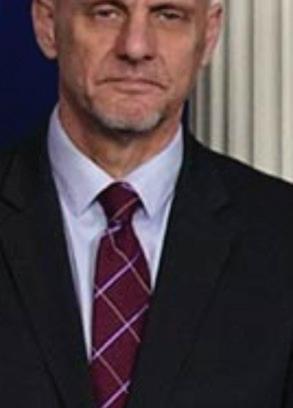





Hope you all froth this one, there’s only three mags left to go now, enjoy it while you can.









Get amongst, Maddy.

15th 16th 18th
August August
UCSA Presidential debate 12pm in Undercroft
UCSA election voting opens
August
UCSA election voting closes

20th 25th
August August
Women’s FIFA World Cup Final Lectures Finish
Daffodil Day
26th
August
Whiteout Festival
All Black's VS Springboks
27th 3rd 9th
August September
Moon Ski #3 @Mt Hutt Hilltop Hoods @ Haere-Roa
September
Southern Sounds in Dunners

















It’s the politics issue. What better politics to talk about that student politics & the UCSA!





The UCSA elections are coming up this week (16th-18th of July – you’ll get an email). If you see any of the candidates out and about, be sure to give them some love! So much work goes into the campaign grind, and it takes guts to put yourself out there. You should all be so proud of the work you’ve done so far! Always love seeing UC come to life in such a vibrant way over this period.



Reflecting on two years as president, I am proud of the work my teams have done. We collectively rebuilt the UCSA’s relationship with Te Akatoki, and achieved complete pay parity between our executives, successfully negotiated with the Christchurch City Council to implement $1 bus fares for all students and under 25’s across greater Christchurch, introduced the first ever clubs expo and mixer to build connection across campus, succeeded in getting lecture recordings permanent in most faculties, restructured the student executive to represent more effectively, revamped the UCSA event’s (including MONO) to better serve student needs, and kept food cheap across campus all while the cost of food increases nearly every day (not to mention free food opportunities on a near weekly, sometimes daily basis).
When I first ran for president, I was undoubtedly sceptical about the UCSA. But over the last two years, I have been consistently in awe of the hard work everyone puts into serving students, and hopefully this is felt by the students they serve.
That’s why as we head into the elections, I am hopeful that the UCSA will continue to build on the successes and more. I encourage students to get engaged – ask the tough questions of candidates, see if they have researched their policies, and hold them to account if they promise the world with no plan for achieving it. The UCSA is the organisation of the UC student community, there is so much that can be done, and your voice is so important in the process.
I started as a UCSA cynic, but I am now (one of) the biggest proponents of this place. And with the elections coming up, I am so excited to have the opportunity to vote for the next group of student’s leaders to take us forward!
As Elections are coming up real fast and time to enroll to vote is NOW!! Last elections showed that as rangatahi it is important to vote and speak as the younger generation. In my opinion, as the generation that will be working, living and operating under these new laws and conditions, OUR VOTE is the most IMPORTANT. A vote is a vote, and every one counts. There will be two voting stations at UC this year, one in Engcore and the other in Te Ao Mārama building I believe! Make sure you’re enrolled and there to vote on the day!
One thing that I would like to mention is the ‘Anti-co-governance protest’ that Julian Batchelor has been leading this year. I am all for freedom of speech, but when that speech is spreading hatred and false statements about a culture and their people, nope. Especially my culture and my people. I have attended a hui myself to stand outside with the Ōtautahi hāpori to sing waiata and spread the aroha and manaaki this movement lacks. The facts he states are not true or accurate but based on his followers' fears so it looks like he's bringing justice, when he is in fact not. I can strongly state that Māori do not eat people for fun, the Treaty is not falsely written by a guy named Michael, and not every Māori owns a gun and plans to start a civil war. More importantly, that cogovernance is a term understood by all, and the misunderstandings do not divide Aotearoa. The C word of the century, co-governance. Co-governance not only aligns to the articles of Te Tiriti o Waitangi but also brings forth iwi Māori voice to the table. The structure becomes shared as it would bring representatives of iwi Māori, and representatives of local government as well so they have equity at the decision table. For more information, read up on what co-governance looks like because it's better to educate yourself than tell people they eat others, am I right? A government without Māori at the table is not one at all. As the indigenous voices of Aotearoa and most of the landowners, they deserve the seat, the table and the right to voice their concerns for the taiao, tangata and future of Aotearoa.
Te Akatoki will be hosting our Annual Pō Whakangahau this October the 14th. This is the time to celebrate our tauira and their achievements! Keep an eye on our social media for more information to come!
Nāku noa, Anna Pohatu (Ngai Tāmanuhiri, Rongowhakaata, Ngāti Porou, Ngāti Kahungungu ki Wairoa)


Key Dates:
2nd October - Advance Voting

14th October - Election Date



easy step



Register
Meet with a MAS Adviser You’re in the draw
Graduates of 2023, we want to celebrate you with a $3k giveaway. Register now, meet with check, then you’re in the draw!
Register at mas.co.nz/grad2023
MAS is proud to be supporting NZMSA, including publication of this guide

Student enrolments in Te Reo Māori courses have continued to rise at UC and across the country.
From 2009 to the end of 2022, UC saw a 118% increase in students enrolled in Te Reo Māori courses.
As of June, this year, there were 376 UC students enrolled in those courses with an additional 1436 students enrolled in Māori and Indigenous Studies courses.
This trend has been reflected at universities around the country with Ministry of Education data showing over a 75% increase in students studying Te Reo across the wider tertiary sector from 2013 to 2022.
Over this period the Otago region saw the largest increase in student enrolments with a 64% increase in Te Reo Māori students in universities.
Universities in the Auckland and Wellington regions also saw increases of 44% and 40% respectively.
The increase in enrolments comes as the number of students studying traditional foreign languages such as German, French and Spanish declined.
The Ministry of Education reported that the number of students studying international languages in universities has decreased from 3355 in 2013 to 783 in 2022.
The changes have seemingly come as more students see the personal benefits learning a Te Reo can provide. But more specifically as students gain a greater appreciation of Te Reo Māori and the Māori culture.
Te Reo student Bethany chose to enrol as it provided an opportunity for her to continue learning after high school.
She thought that the shift in the way we view and value the Māori language and culture as a country was helping to drive up student numbers.
"As it becomes a lot more normalised in society more people want to learn it,” she said.
Another factor she thought was behind the continued rise is students are seeing the personal benefits of learning Te Reo In addition to the benefits learning the language can provide after study as a valuable skill that can create many future career opportunities.
"I think career-wise a lot of different pathways look for people who can speak te reo, so it provides a lot of different opportunities."
She encouraged other students to enrol in Te Reo courses finding it to be a unique learning opportunity that can provide greater insight into not just the Māori language and Māori culture.
"The language is the gateway to the culture so in learning the language you also get to learn the culture."
With the election fast approaching, a second University of Canterbury student has announced they are standing, this time in the electorate seat of Christchurch Central.
Matt Fisken, a law and political science student at UC, has been selected as the Act Party candidate for the Christchurch Central electorate.
In the last Canta issue, we reported on Luke Jones, a political science and communication student, standing for the Labour Party in Selwyn.
Fisken, who is 47th on the Act Party list, was a Youth MP for ACT MP Nicole McKee during Youth Parliament in 2022. Originally from Invercargill, Fisken is on the ACT Region 8 and Young ACT Canterbury committees.
Fisken told Canta that his opposition to firearm law reform in 2019 is what got him into politics. Fisken believes the legislation unfairly targeted responsible law-abiding licensed firearm owners, saying that the reforms have prevented him from participating in certain divisions of sports shooting.
“Only the ACT party spoke out against the rushed legislation and highlighted the issues it would cause, it was then that I first became involved in the ACT party,” he said.
Since then, he has been heavily involved in the ACT Party as a Youth MP in 2022, a local volunteer at events, as well as founding ACT on Campus.
“The ACT Parties' classical liberal values align with my personal views around personal freedom, responsibility and limited
government interference,” he said.
“I believe that all people have equal rights and should be given equal opportunities to succeed. I support laws and policies which help keep our communities safe and allow our country to be productive and prosperous.”
Fisken is realistic about his chances in Christchurch Central and says that his campaign would focus on increasing the party vote in the electorate.
The inner-city electorate has predominantly been a Labour strong hold with the seat being held by both the former Labour Prime Minister Geoffrey Palmer and the former Christchurch mayor Lianne Dalziel.
From 2011 – 2017 former National MP Nicky Wagner held on to the seat by a slim margin until being defeated by incumbent Labour MP, and former UC Law lecturer Dr Duncan Webb, who has held the seat since then.
Fisken is up against Webb as well as National candidate Dale Stephens, Green candidate Kahurangi Carter, and NZ First candidate Mark Arneil.
Fisken’s message to young or first-time voters was to take time to look into their local candidates and their party’s.
“If someone does this, they will see that the ACT party is the only party that will deliver real change and put New Zealand back on track to being a prosperous, safe and successful country,” he said.
The government has reversed a decision on carbon pricing after losing a climate court case and a price collapse.
Climate Minister James Shaw announced the updated decision on the 2023 – 2028 carbon pricing for the Emissions Trading Scheme (ETS) in late July. It came after the government had been ordered by the High Court to reconsider the settings.
ETS settings are adjusted annually and are recommended by the independent Climate Change Commision which was established with bi-partisan support by the Zero Carbon Act 2019.




The Zero Carbon Act sets that the Climate Change Minister must ensure the settings are in line with domestic climate targets and international agreements such as the Paris Climate Accords.
The ETS is a carbon pricing scheme where polluters buy credit for their emissions, as the price for ‘carbon credit’ rises, it incentivises polluters to reduce their emissions or face paying more. Under the ETS, forestry is also considered a carbon sink, and therefore can earn carbon credits incentivising the planting of trees.
Set to come in from the December 2023 auction the ETS will now have a higher auction reserve price and a reduced number of carbon units available for auction.
The Climate Change Minister James Shaw said that the decision would drive stronger action on emissions reduction targets.
“The New Zealand ETS is a key tool for meeting our climate change obligations and for ensuring that those responsible for
The ETS faced issues with the price of units being too low in 2021 and 2022, with the government selling 14 million more units then intended, meaning more emissions. The commission had recommended last year that the government raise the price lid from $78 to $171 to reduce the number of units sold.
Lawyers for Climate Action took the government to court when cabinet went against the advice of both the commission and Shaw. The Labour government had been concerned that a rising carbon price would worsen the cost-of-living crisis.
In court the government’s lawyers admitted that the impact of rejecting the advice had not been adequately considered. High Court judge Matthew Palmer ruled that this meant the government was in breach of the Zero Carbon Act.
Shaw said that the judicial review was about the process followed for the 2022 ETS settings decisions, not the decisions themselves. “The government accepts there were deficiencies in the process and has moved quickly to fix them,” he said.
The pricing decisions comes as the ETS is set to undergo more reforms as the government seeks consultation on the way it operates. The Climate Commission had warned that the ETS was not effectively encouraging companies to reduce emissions, rather making it cheaper to pay for the emissions than invest in ways to reduce them.
Georgia Walker (she/her)
The popularity of fidgets began with the emergence of fidget spinners in 2017, and more recently, pop-it fidgets have taken centre stage, even earning dedicated sections in stores like Kmart.
Traditionally, these wonderfully colourful, textured and squishy sensory objects, known as stim toys or fidgets, were designed to occupy the hands of neurodivergent individuals. Who are estimated to make up around 15-20% of the population, according to the Institute of Neurodiversity.
Neurodivergent is a term that describes people whose brain learns, processes and functions differently from what is considered ‘typical’ – this can include diagnoses such as ADHD, Dyslexia, Dyspraxia, Autism and Tourette's Syndrome, among others.
But what exactly makes these toys so captivating and helpful to a significant community of people?
UC Psychology Senior lecturer above the bar, Dr Seth Harty, said some neurodivergent individuals use fidgets to "increase their sensory experience."
For some people, fidgeting can productively stimulate the brain and, in turn, improve focus, reduce anxiety or stress, promote creativity, regulate emotions or relieve restlessness.
Dr Harty said that researchers are still developing their understanding of sensory objects, but they have observed that fidgets can be more distracting than helpful for some people.
Dr Harty said it's about finding what works for you, and "If it's taking your attention away, then it's not working.”


Co-President of the Neurodivergent Society (NDSoc) at UC, Inari Evison, was diagnosed with autism and ADHD in 2021 and has found fidgets beneficial.
NDSoc is a newly established club at UC that aims to unite neurodivergent students and foster a safe, supportive community. It welcomes all students, and diagnoses are not required for entry. Despite being very open about being neurodivergent, Evison said she doesn't bring sensory toys to uni unless she's sitting an exam because she sometimes feels "a bit self-conscious."
Instead, she fidgets with pens in class as it is more discrete and quiet.
To help normalise fidgets, NDSoc had a fidget station at their club's day stand filled with "stimmy things" borrowed from club members.
"Some people were like, oh my gosh, this is like the coolest thing that I've ever touched," she said.
Inari said the fidget station was a fun way to connect with potential new members as "different neurodivergent people like different sensory stuff," so it prompted lots of discourse and interaction.
Evison said her favourite fidgets are popping fidgets, fidget cubes and soft toys like squishmallows.
She said she has always been a fidgety person and was first exposed to the concept of sensory objects through the emergence of fidget spinners.
Her fidgeting began with the purchase of a cheap, $2 sequinned Christmas decoration from a discount store.
"You can make fidget toys out of anything really if you're fidgety enough," she said.
Evison said using fidgets "feels nice, and it feels good," especially when concentrating, managing emotions, or simply seeking fun.

In a historic move, the University of Canterbury held its firstever careers event exclusively with, and for, women and non-binary individuals this past July.
Before the microphones turned on, a diverse range of students filled the audience, all engaged in comfortable chatter as Lady Gaga's Born This Way played in the background, setting the tone for the conversation.
The event brought together a panel of inspiring figures, including Dr. Hafsa Ahmed, Chris Beardsley, and Ari Nicholson, who all discussed their unique career journeys, struggles, and triumphs within the social and cultural context of Aotearoa.
“I am not a victim of my life. What I went through pulled a warrior out of me and it is my greatest honour to be her” –Rupi Kaur
This is how Dr Hafsa Ahmed described her struggle as an immigrant student, woman, and hijab wearer following her 2007 arrival in Aotearoa from India.
UC Postgraduate student, Valeria Sanchez, said she felt "inspired" and could relate a lot to Dr Ahmed, as Sanchez herself is an immigrant from Mexico.
Drawing parallels with Dr Ahmed's challenges, who spent over two years applying for nearly 200 jobs in Aotearoa without success, Sanchez shared her own struggles with finding employment after moving to the country.



She said she sent her CV to hundreds of companies and was either rejected or did not get a response.
“I was expecting things to be different,” she said.
Sanchez said she feels that there is much to be done
in Aotearoa regarding openness and possibilities for immigrants.
Leaving the career conversation, she said she felt inspired to focus on her career in teaching languages and empowered to break barriers.
The career conversation also delved into how to navigate the patriarchy, deal with feelings of failure, embrace feminism, address homophobia and understand the intersection of parenthood with one's career.
Chris Beardsley, born in 1950 during the emergence of the first wave of feminism, said finding her “inner steel” helped her to stay strong when faced with unwelcoming men in male-dominated sectors.
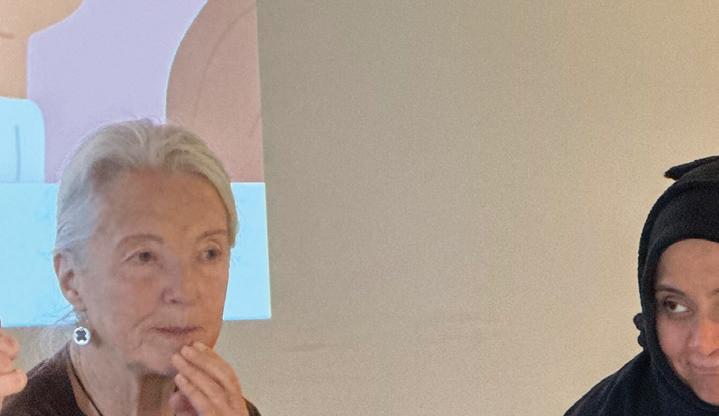
“They wanted to fight and test me, but I didn’t take the bait. They gradually learnt that they couldn’t unsettle me,” she said.
A similar sentiment was shared by Ari Nicholson as they reflected on their childhood, their journey of self-discovery, their involvement in advocacy and the complexities and joys of parenthood.
“Be ambitious, do not give up. Keep fighting for what you want, if it doesn’t work one way, find another way to make it work,” they said.
As the career conversation came to an end, students were encouraged to express their thoughts on the event by leaving a note on the bulletin board located near the exit.
Among the responses, one student's sticky note stood out, stating that the most valuable aspect of the event was the “frank discussion of struggles” and the “reassurance of identity, values and community as three key foundations.”

A gunman killed two former colleagues at a construction site in Auckland the morning of the Football World cup kick-off. After an exchange of gunfire with police, the 24-year-old gunman died of self-inflicted injuries.
Six people were injured including a police officer in the early morning mass shooting that shocked the country. The Prime Minister confirmed that the shooting was not politically or ideologically motivated. The gunman was later named as Matu Tangi Matua Reid, who was serving a sentence of home detention for domestic violence convictions. The shotgun used by Matua Reid was not prohibited, but he was not licensed to possess it.
A minute silence for the victims of the shootings was held prior to the Women’s Football World Cup at Eden Park that night. The two men killed were named as Solomona To’oto’o, 45, of Manurewa and Tupuga Sipiliano, 44.
Justice Minister Kiri Allen has resigned from all portfolios after being charged by police for a car crash in Wellington. The police confirmed that Allen had been charged with careless driving and refusing to accompany a police officer, as well as having received an infringement for excess breath alcohol 250mcg and 400mcg.
The former minister apologised for her actions saying that “...many people have placed their trust and confidence in me as a political leader. I have failed all those that put their trust and confidence in me. I have let my electorate down, my party down, and all those that relied on me.”
Allen will not be seeking re-election in her East Coast electorate, instead Labour MP Tāmati Coffey has reversed his decision to retire and will run in her place. Allen had recently taken time off work for mental health issues amid allegations of bullying in her office.
Heatwaves across North America, Europe and Asia have broken world heat records as forest fires rage in Greece and Canada. The world's hottest day was July 6th according to data from the U.S. National Centres
for Environmental Prediction, and even that may be broken again.
The World Meteorological Organisation has predicted it is likely that July 2023 will be the hottest July, and month on record. World Meteorological Organization’s Secretary-General Professor Petteri Taalas said that this is the harsh reality of climate change.
“Record-breaking temperatures are part of the trend of drastic increases in global temperatures. Anthropogenic emissions are ultimately the main driver of these rising temperatures,” he said.
“The need to reduce greenhouse gas emissions is more urgent than ever before. Climate action is not a luxury but necessary.”
The Australian Prime Minister Anthony Albanese has meet New Zealand Prime Minister Chris Hipkins for the annual Australia-New Zealand Leaders Meeting. The meeting comes as NZ and Australia jointly host the Women’s World Cup.
The two PMs celebrate 40 years of Closer Economic Relations, as well as the Trans-Tasman Travel Arrangement. They attended the National War Memorial to recognise the 70th anniversary of the Korean War armistice, where ANZAC troops served as part of the UN mission.
Together they committed to a Trans-Tasman Roadmap 2035 which will guide the two countries to achieve a shared vision by focusing on sustainable economies, security and resilience, pacific engagement, upholding principles and values, and people.
At the same time the US Secretary of State Anthony Blinken met with New Zealand’s Foreign Minister Nanaia Mahuta. Blinken later met with the PM Chris Hipkins before attending the football match between the US and the Netherlands at Sky Stadium in Wellington.
Mahuta said the meeting with Blinken was a chance to reaffirm the US-NZ close partnership, discuss many of our common interests and identify areas they could further strengthen cooperation. During the joint press conference Blinken left the door open for New Zealand to join Pillar II of AUKUS and took the chance to condemn the on-going coup in Niger.
As Aotearoa embarks on its political journey, and students start googling ‘how to vote’, pressure begins to settle. Politicians can either rise to the occasion or fall between the cracks, but is it really a choice?
Mental health and politics, a collision of words rarely together unless it’s ammunition for a catchy headline. With the election creeping up, it appears the only real conversations about mental health arise when a politician reaches the finish line as a result of their mental public destruction.
Despite the absence of a political bone in my body, it’s not hard to understand that being a politician is a tough gig. Behind the policies, suits and the billboards are human beings, with brains, hearts and feelings.
On January 19th 2023, Jacinda greeted the new year with a shock resignation, and the conversation began to linger about whether it was a result of burnout. Alluding to that case, in her resignation speech she said, “I no longer have enough in the tank to do the job.”
Her journey as Prime Minister was no mean feat, battling Covid, a reprimand of angry citizens due to lockdowns, the tragic mosque shooting as well as the White Island eruption.
During this time, another story started to encompass national headlines…the resignation of National party leader,
Todd Muller. After a brief 53 days as leader of the opposition, Muller stepped down from the role after slowly mentally deteriorating, resulting in what was labelled a “public breakdown.”

53 days of leadership, 100 days out from election, 10kgs lost. The price of power, but at what cost?
“I was terrified, I mean I was so sick. I knew about two or three weeks in that I was gone” said Muller. “But I could not accept that I was, because I was terrified because of whatever it would mean to the reputation of the party, of myself, of my wife and my teenage kids can have a dad that's had a public mental breakdown.”
His resignation resulted in the crowning of the shortest serving political party leader, but after conversing with Muller over a cuppa, 53 days was not short enough.
“It got to the point, where on a Monday morning, the pain was so bad I just wanted it to stop. And I've been asked before was that suicidal? I don't believe it was.”
“I can remember the feeling in my head, if I could just stumble and fall down here on these concrete steps, then the pain will go away. Because I'll have to go to hospital. And I won't be able to carry on doing this job.”
As news sites pumped out multiple
come with it.
articles on his resignation, it felt as though they brushed the surface of his mental health struggles, speaking purely the facts of what Muller had presented to the public.
But it’s not often we see high up male political figures acknowledging their struggles with mental health whilst opening up about it to a nation.
I connected with Muller through email, with no expectation of a response due to the election. However, a few days later we had locked in a time to meet.
Greeted by a firm handshake, a sunny smile and a flowing conversation, my heart gently returned to its normal rate, as my brain finally recognised that I’m interviewing a human being, not just a politician.
Before politics was disseminated through slightly cringe TikToks, Muller reveals how his love for politics grew through scanning a world Encyclopaedia book as a young boy. Exposed to the
“Over time… I grew harder and harder skin. But whilst it might keep the rain out, it doesn’t allow the emotions out either”Elsie Williams (she/her)
“Over time… I grew harder and harder skin. But whilst it might keep the rain out, it doesn’t allow the emotions out either”
world of US politics first, Muller practiced ex-presidents’ signatures, whilst imaging their lives and dreaming he could once step into a similar role one day.
With a determined mindset, he continued to take steps in order to pursue his dreams, working as a young Nat whilst at uni, completing his master’s in politics, further moving closer by working under Prime Minister Jim Bolger as his executive assistant at the ripe age of 25.
After hanging up his democratic hat for a brief 20-year intermission, he returned to the re-directed political wheel when he was 45 due to a “big blue seat” appearing in his hometown after Tony Ryle stood down.
Little did he expect his journey would take such a sour turn, when taking up what he classified as possibly the hardest role in Aotearoa politics, leader of the National Party, and leader of the opposition.
was proactive. He saw his doctor, got the sleeping pills, was prescribed medication, attempted the typical yoga wellness tactics, but the weight was clearly too much to carry. 20 hours of work in a single day, resulted in zero chance of breaking the cycle. It pushed Muller deeper into the pit.
As Muller re-lived his relentless pain induced by his political power, his body and face dissociate back to that hard place, showing the lingering presence of hard times.
“Over time… I grew harder and harder skin. But whilst it might keep the rain out, it doesn’t allow the emotions out either.”
Resigning as leader of the National Party did not conclude his political journey, as he became the MP for the Bay of Plenty. He’s evidently grateful for the support amongst the community, mentioning the power of social media for the lovely messages he’s been flicked, as well as the support from his children’s mates and their chill and understanding energy. But something Muller had never accommodated for was triggers.
and mentally. Bringing to light the ugly side of politics, where serious mental breakdowns are publicised and the ability to maintain privacy is out of reach.
Chloe Swarbrick, who entered politics at a fresh 23, has experienced the turmoil of parliament and the effect it can have on mental ill health.
“We've not set up a political environment to get the best out of people,” she said.
“You are detached from who you are as an individual, and you become a concept. And when you're a concept people can project onto you whether those are positive or negative things.”
Where is the support for our politicians? The people who hold the power, create our laws and pave our future? Do we really want politicians with minimal mental support running our government?
Muller depicted how his journey began smoothly. Until day five, when the hurricane began.
He’d conversed with ex-Prime Minister John Key while driving from Auckland to Tauranga, feeling confident, and content until suddenly a puzzling phenomenon seized his body.
“I got absolutely poleaxed by huge waves of anxiety and nervousness. It felt like waves of terror that would start at my feet and sort of come up over my head. And they would just keep going.”
Succeeding his first encounter with a chilling panic attack, he confided with his wife about this feeling, accompanied by some tears, but woke up the next day feeling a little drained. The days proceeded, and they just got worse, and worse and worse.
If five days of being the leader can produce this amount of stress, it does provoke the question, how truly intense is this job?
Despite the shock to his system, Muller
“Going down to Wellington, I found very hard because I was surrounded by all these triggers. I never truly understood what triggers were before, I was empathetic, but didn’t really get it” he said.
“I get that now it is a visceral response. And parliament is full of moments and corridors and spaces that remind me of that.”
During Mullers political leadership, his breakdown sparked a large conversation in the world of parliamentary power, and in more recent times, we can see this conversation beginning again.
Plastering national headlines currently is the shocking news regarding ex-Labour MP Kiri Allan being charged with careless driving and resisting arrest. 250-400 mg of alcohol was detected on her breath following the arrest, and her resignation quickly followed suit.
Kiri Allan’s public exit could be seen as her tipping point, but in reality, her mental health struggles have endured for a while, after many breaks from the political sphere due to personal struggles.
This further sparks the worry of how far these politicians are pushed physically
With broken people and possibly a broken system, there is serious thought that needs to be moved towards what the future of parliamentary spaces look, sound and feel like.
“Parliament is such a weird space man. There’s nothing like it. It's like Hogwarts, but meaner” said Swarbrick.
“…I don't think it is a good base for building a healthy culture for anyone.”
After questioning the support amongst the political community, it appears both Swarbrick and Muller found support through their own measures. Swarbrick comments on her blessed green party matriarchs, with Muller touching on his long car journey chats with John Key.
My coffee was still half full when we said goodbye. It was impossible to steer myself away from anything but our conversation, as I was truly captured by Mullers authenticity and vulnerability.
“I wasn't brave because I stood out. I was broken. I could not stand up” said Muller.
But I beg to differ. He denied his bravery, but his experience rang true. Proving that stories like Todd Mullers are worth telling, and mental health conversations will never go to waste.
“I wasn't brave because I stood out. I was broken. I could not stand up”
“Parliament is such a weird space man. There’s nothing like it. It's like Hogwarts, but meaner”
~Chlöe Swarbrick
“Parliament is such a weird space man. There’s nothing like it. It's like Hogwarts, but meaner”
~Chlöe Swarbrick
“I wasn't brave because I stood out. I was broken. I could not stand up”
If you’ve ever said, “Gee, I wish there was one place where all the major political parties in the country are summed up, broken down and explained in a way that’s relevant to me as a student and isn’t trying to get me to vote for a particular party…” then do we have news for you. Here it is - a nice and neat little summary of New Zealand’s’ biggest political parties!
Unless you study politics, chances are you don’t know much about it other than that Aunty Cindy quit and it’s just another dude named Chris running the country. It’s okay, you can admit it - we’re all political dummies.
So to make it easier (and to make sure you actually vote) we’ve done the hard work for you. We’ve picked out policies that are relevant to you (because if we actually put all of them, it might take up the entire magazine) and broken down all the political jargon that confuses even the best of us at times. I know, I know, you’re so welcome, no really it was nothing (it took us five weeks lol). Go vote please.
Political Spectrum
The whole ‘left wing, right wing’ thing is more of an American ideal, but New Zealand’s political parties can be loosely categorised on this spectrum. The specific positions and priorities of parties may shift in response to changing circumstances and public opinion.
Left: Left-leaning parties typically advocate for social equality, progressive policies, and government intervention in areas like healthcare, education, and welfare.
Centre: Centrist parties generally aim for a balance between social and economic policies. They prioritise practical decision-making and consensus across ideologies.
Right: Right-leaning parties tend to support free-market principles, individual liberties, and limited government intervention. They prioritise personal responsibility and economic growth.
Three Waters refers to the three essential services related to water - drinking water, wastewater (sewage) and stormwater. Currently, 85% of this is managed by councils and every year around 34,000 people in New Zealand get sick from drinking water, as well as thousands of households who have to boil their water to drink it safely. The Three Waters reform aims to create a safe and healthy way of managing our water systems.
Passed in 2019, the act aims to address climate change by setting long-term goals for reducing greenhouse gas emissions and to limit the global average temperature increase to 1.5OC under the global Paris Agreement. It’s based on 4 key components:
1. Set a greenhouse gas emissions reduction target for New Zealand to reduce net emissions of greenhouse gases to zero to 2050.
2. Establish a system of emissions budgets as smaller goals towards the long-term target.
3. Develop and implement policies for climate change adaptation and mitigation.
4. Establish an independent Climate Change Commission to keep successive governments on track to meet long-term targets.

Tax brackets are adjusted to account for cost of living caused by inflation. This prevents taxpayers being pushed into higher tax brackets because of inflation, resulting in a tax increase.
An economic system based on supply and demand with minimal or no government intervention.
Indigenous Rights Leaders: Debbie Ngarewa-Packer & Rawiri Waititi

Christchurch General Election candidates
• Hana-Rāwhiti Maipi-Clarke (Wigram)
• Tākuta Ferris (Te Tai Tonga)
In a nutshell
• Push for improved Māori outcomes that are guided by kaupapa tuku iho values.

• Remove the British Royal Family as Head of State.
Housing
• Build 2000 houses on our ancestral lands over the next two years and ensure half of all new social housing is allocated to Māori.
Economy
• Remove GST from all food.
• Raise the minimum wage to $25 per hour and plan for annual increases.
Environment
• Ban seabed mining to prevent international companies targeting the Taranaki Coast and more.
Libertarian Right Leader: David Seymour

Christchurch General Election candidates
• Laura Trask (Banks Peninsula)
• Matthew Fisken (Christchurch Central)
• Toni Severin (Christchurch East)
• Ben Harvey (Selwyn)
In a nutshell
• Increase the role of free markets and advocate for personal freedom and individual responsibility.
Housing
• Incentivise regional councils to build new homes through GST-sharing.
Economy
• Reduce the number of income tax rates to two rather than five
• Unilaterally abolish NZ’s remaining tariffs.
Environment
• Repeal and replace the Zero Carbon Act.
Right Wing Leaders: Ted Johnston & Helen Houghton
Christchurch General Election candidates

• Helen Houghton (Christchurch East)
• Chris O’Brien (Ilam)
In a nutshell:
• Honour Christian heritage through conservative tradition.
Much like Labour, New Conservative are still finalising their policies for the upcoming election. Here are their seven principles.
• Defend the right to life and stand against abortion and euthanasia.
• Fund Māori-led community energy projects, clean technology projects, and transitions to regenerative Māori farming practices.
• Focus on the restoration and protection of degrading freshwater habitats and acknowledge Māori proprietary rights and interests relating to freshwater.
Health & Education
• Further fund and resource Māori students.
• Make te reo Māori and Māori history core-curriculum subjects for students up to year 10.
• Introduce a universal student allowance and double student allowance rates.
• Free public transport for students at all levels.
• Work towards writing off the total student loan for those who work in Aotearoa for at least five years and write off the living cost component of all student loans.
• Establish a Māori health funding authority.
Other
• Return land to Māori whānau and iwi.
• Establish a Māori Parliament.
• Scrap Three Waters and allow community control of water assets.
Health & Education
• Introduce a Teaching Excellence Reward Fund to increase the pay for high performing teachers.
• Crack down on truancy with daily national attendance reporting and stricter monitoring.
• Publicly subsidise common elective surgeries in private hospitals.
Other
• Simplify immigration laws and processes.
• Increase the power of Police to seize the assets of gang members found with illegal firearms.
• Replace the Resource Management Act, reducing the need for consents to make it easier to build supermarkets and logistical infrastructure.
• Repeal aspects of the Arms Legislation Act 2020 and allow hobbyists and hunters to exercise their rights of use.
• Remain family focused and advance the well-being of families
• Support lower levels of authority and defend the authority over affairs of families, institutions, and communities.
• Protect New Zealand’s natural resources.

• Provide equal access to justice regardless of economic status.
• Improve conditions for the ownership of production and property, support workers’ rights, and provide sufficient income for those unable to work.
• Protect the heritage of distinct New Zealand communities from “hostile agendas.”

Centre Left Leader: Chris Hipkins

Christchurch General Election candidates
• Duncan Webb (Christchurch Central)
• Reuben Davidson (Christchurch East)
• Sarah Pallett (Ilam)
• Megan Woods (Wigram)
• Tracey McLellan (Banks Peninsula)
In a nutshell
• Provide greater economic security for kiwis through keeping debt low and supporting businesses.
• Get on top of long-term issues such as the housing crisis and child poverty.
Centrist Leader: Raf Manji

Christchurch General Election candidates
• Raf Manji (Ilam)
In a nutshell
• Focus on implementing a fair tax system, affordable housing and climate opportunities.
Housing
• Switch to a land value tax of 0.75% of the value of urban residential land which would fund income tax cuts and increase housing affordability.
Economy
• Implement a tax-free threshold for people earning under $15,000 per year, affecting 1.7million kiwis.
• Shift income tax brackets providing $5.8b in tax cuts.
Populist Leader: Winston Peters

Christchurch General Election candidates
• Mark Arneil (Christchurch Central)
• Shane Wiremu (Christchurch East)
In a nutshell
New Zealand First Pillars

• Fair democracy and equal citizenship.
• Building a prosperous nation.
• Protecting community and country.
• Sovereignty and responsible government.
• Self-sufficiency and pragmatic environmentalism.
Housing
• No policies on housing have been released as of 30th July 2023.
Economy
• Ensure adequate funding for St John, Plunket, Mike King’s Gumboot Friday, Rescue Helicopters and Surf Lifesaving NZ.
• Ensure tax brackets are adjusted to inflation.
• Get people on unemployment benefits back into the workforce.
As of writing this, Labour have been quiet on the policy front but we’ve collected a few snippets of what they have officially state are in mind.

• Adjust the sentencing act to make posting crimes online an aggravating factor during sentencing.
• Introduce a specific offence targeting ram raids.
• Won’t bring in a capital gains tax or wealth tax or raise the age requirement for superannuation eligibility.
• Continue to increase the scale and pace of house building through their Housing Acceleration Fund.
• Invest in low carbon transport and further support schools, hospitals and businesses to switch to cleaner energy.
Environment
• Increase biodiversity via a national system that rewards native regeneration of landscapes.
• Strengthen the Emissions Trading Scheme (ETS) to increase emission reductions rather than incentivise offsetting.
• Ensure a 100% zero-emission bus fleet of 3000 by 2030.
Health & Education
• Introduce a “Teal Card” - the under-30 equivalent to a Gold Card. It allows young people access to fully-funded healthcare and public transport, and a Universal Savings Boost’ of $5000 into a KiwiSaver account upon completion of a National Civic Service Programme.

Environment
• Replace the Dome Valley rubbish dump in Northland with a Waste to Energy plant.
Health & Education
• Ensure Pharmac has more funds and “concentrate on performance not puffery.”
• Remove GST from basic foods including fresh food, vegetables, meat, dairy and fish.
• Restore education and “stop indoctrination by removing gender ideology from the curriculum, especially from primary school.”
Other
• End vaccine mandates.
• No change to the age requirement for Superannuation (65).
• Change all of the “woke virtue signalling” names of every Government department back to English.
• Establish a designated gang prison to minimise prison recruitment of non-gang members.
Leaders: Marama Davidson & James Shaw

Christchurch General Election candidates
• Lan Pham (Banks Peninsula)
• Kahurangi Carter (Christchurch Central)
• Mike Davidson (Ilam)
• Richard Wesley (Wigram)

• Sarah Ahmed (Christchurch East)
In a nutshell
• “Push for the people, the planet and putting up ideas for economic transformation” - Marama Davidson.

Housing
• Ensure a safe, warm, and affordable home for everyone through improving Healthy Homes Standards, scaling up Kainga Ora building programme and supporting first-home buyers & the homeless, with a focus on affordable long-term homes and rentals.
Economy
• Enforce a capital gains tax or wealth tax.
• Introduce a tax-free threshold at the bottom end of the income scale (people earning under $125,000) as part of a wider tax reform.
Environment
• Support the autonomy of whānau/hapū/iwi and Māori businesses to develop their own climate change adaptation plans.
• Rapidly phase out the dependence of our economy on fossil fuels and cease new oil exploration.
• Require that all Government policies and actions align with our global obligation to restrict global warming to within 1.5OC of pre-industrial levels.
Health & Education
• Work towards a ‘fee-free’ public tertiary education system.


• End classroom streaming or grouping by perceived ability.
• Meet health union demands for fair wages.
Other
• Change the voting age to 16.
• Progressively increase New Zealand’s refugee quota.
• Legalise recreational cannabis use.
Centre Right

Leader: Christopher Luxon

Christchurch General Election candidates

• Dale Stephens (Christchurch Central)
• Matt Stock (Christchurch East)
• Hamish Campbell (Ilam)
• Tracy Summerfield (Wigram)
• Mahesh Muralidhar (Banks Peninsula)
In a nutshell
• Aims to be the government of lower tax.


• Strengthen New Zealand’s economy and tackle the cost of living crisis.

Housing
• Continue to oppose a capital gains tax, as they blame wealth inequality in New Zealand on Labours’ economic mismanagement.

Economy
• Nationals’ five point plan to deal the with cost of living crisis:
• Refocus the Reserve Bank on price stability.
• Stop adding unnecessary costs to businesses, employers and the productive economy.
• Reduce bottlenecks in the economy that are holding back economic growth (50,000 people on jobseeker benefits whilst job vacancies are at record high).
• Income relief for taxpayers and will at the very least include indexed income brackets.

• Restore discipline to government spending.
Environment
• Repeal Labour’s Three Waters legislation and scrap the four mega-entities - The Water Services Entities Act, The Water Services Legislation Bill, The Water Services Economic Efficiency and Consumer Protection Bill.
• Set stricter water quality rules.
Health & Education
• Grow the skills to create the workforce by fixing broken immigration settings and getting the education system back to basics.
• Train more nurses and doctors and incentivise them to stay in NZ by paying student loan repayments of up to $4,500 for up to 5 years, provided they remain working in the country.
Other
• Combat youth offending by creating a Young Offender Military Academy where Young Serious Offenders (YSO) aged 15 to 17 can be sent for up to 12 months.



On the sixth of May 2023, Charles Mountbatten-Windsor was crowned King of the United Kingdom and the Commonwealth Realms. As New Zealand is one of the fourteen countries that make up the Commonwealth Realms, we officially have a new monarch.
Aotearoa New Zealand is a constitutional monarchy and representative democracy. We have a parliamentary system, following MMP (mixed-member parliament) instead of the more common FPTP (first-past-the-post).
The British monarch – in this case, King Charles III – is New Zealand’s sovereign and head of state. His family and office are known as The Crown, represented in Aotearoa by the GovernorGeneral, presently Cindy Kiro (Ngā Puhi, Ngāti Kahu, Ngāti Hine), who is appointed to perform royal duties.
Gwen Palmer Steeds is an author and student who co-wrote the book Democracy in Aotearoa New Zealand: A Survival Guide with their grandfather, former Prime Minister, Geoffrey Palmer.

Gwen’s experience is mainly focused on the work of the GovernorGeneral. They describe the position: “The Governor-General’s role has three main parts of it: a ceremonial part, a constitutional part, and a community part.”

Gwen describes the ceremonial duties: “it includes representing the Crown on formal occasions, such as welcoming Heads of State from overseas to New Zealand, or at important events such as Anzac Day or Waitangi Day.”
The Honours lists, released at New Year’s and for King’s Birthday, award royal medals and decorations to notable New Zealanders. Gwen says that the ceremonies for these honours are held by the Governor-General. “That’s probably one of the most well-known parts of the community side of the role.”
Gwen describes the constitutional side, “The Governor-General marks the opening of each new Parliament by reading the speech from the throne. She also gives royal assent to bills and presides over Executive Council meetings.”

Royal assent is the very last step in a long line of stages a bill must go through, but the Crown aren’t acting just on their own opinion when deciding when to sign and when not to. “The GovernorGeneral acts on the advice of the Ministers, so they must give royal assent. However, there are rumours that some Governor-Generals liked to sign bills they didn’t like in a different colour pen!”
Presided over by the Governor-General, the Executive Council meets every Monday. Gwen describes it as “essentially a forum through which Ministers can advise the Governor-General and keep them up to date on what is happening in Parliament.”
Gwen says the Crown’s powers are broadly more “big picture,” and “the day-to day running of the place is conducted by the House of Representatives, who are all selected by the people. Yay democracy!”
While much of the Crown’s regular influence is ceremonial and routine, they still hold the ability to enact significant change. “The Governor-General also has ‘reserve powers.’ These are meant to protect the democratic integrity of the state. The GovernorGeneral has the power to appoint a Prime Minister or accept





the resignation of a Prime Minister.”

These powers are more hypothetical, for break-glass-incase-of-emergency situations. “They also hold the power to force Parliament to dissolve or dismiss a Prime Minister!” Gwen says. But it’s never occurred before – “this would only happen under the most exceptional of circumstances.”
Still, it’s an enormous amount of power. The monarchy is hereditary by design; in a hypothetical worst-case scenario, an incompetent monarch could remove power from the leaders elected by the people, despite only being assigned by birthright themself.



“The extent of the power of the Crown has changed over time quite significantly. In the early days of the British monarchy, the Crown’s power was pretty much absolute. The King even often personally led armies into battle!”
The Crown are responsible for upholding the principles of Aotearoa’s founding document, Te Titiri o Waitangi. The relationship between the Crown and mana whenua is complex and ongoing, and colonisation is one of the most vital points of discussion when considering the past and future of the Crown in Aotearoa New Zealand.
In 1998, the Crown issued an official apology to Ngāi Tahu, stating that the Crown had acted “unconscionably and in repeated breach of the principles of the Treaty of Waitangi in its dealings with Ngāi Tahu in the purchase of Ngāi Tahu land”.












































On their website Ngāi Tahu describe the statement’s importance: “Receiving an apology for misdeeds, however long ago, is always the first step in the healing process.” More steps have continued since. There are far more yet to come.


















The coronation was met with a mixed reception from Aotearoa. At seventy-three years old upon his ascension, Charles III had a more fraught reputation than his mother had when she became Queen at twenty-five. The monarchy as a whole slumped in terms of favour with Kiwis: a Reid Research poll of New Zealanders found that 36.4% of respondents now wanted Aotearoa to become a republic.
Charles III has a tremendous responsibility as our head of state. His role, and his powers, may change as his reign continues and his reputation develops.

Gwen says that the Crown must always shift when a new monarch inherits the throne. “The powers of the Crown stay exactly the same, and the functionalities, but the flavour of the person definitely changes depending on who holds each role.”
He’s unlikely to lead us into battle, but he and his representatives are still here, working on the constant tiny battles that make up the democratic process.
“Now, a lot of the power comes from ceremony and prestige,” Gwen says. The procession of Charles’ golden carriage reminds us of what power once was, what it has become, and what it is yet to be.
foundingTikTok has been infiltrated. Yes, it’s true, TikTok is no longer a silly little platform where silly little kids do silly little dances - now we have to deal with politicians too. New Zealand’s political parties are putting their low-wage Gen Z interns to work and they’re all fighting each other for the attention of people aged 18-25.
Objectively, National are killing the TikTok game. They’ve got consistent branding with a mix of informative videos, dramatic montages, and a solid amount of TikTok trends in there. There’s even multiple videos of a split screen between a Chris Luxon interview and a compilation video of either kinetic sand cutting, molten glass creations and the classic ‘Is It Real Or Is It Cake?’ Luxon himself is a bit of a TikTok icon, openly man-crushing on Cillian Murphy in Oppenheimer and starring in his partners ‘Day in The Life’ videos.
National’s TikTok account frames Deputy Leader Nicola Willis as being a powerhouse, advocating in parliament and taking that information straight to TikTok, just for you. Comparatively, Luxon’s videos are of his interactions with the public, interviews, and speeches, disseminating him more as the real face of National.
Also jumping on those TikTok trends is the Green Party. MP Chlöe Swarbrick features heavily on their page with the occasional appearance from co-leaders Marama Davidson and James Shaw.
While a lot of these videos are informative, the Greens are mostly using these TikTok trends to shit on other parties, particularly National and their proposed tax budget. The Green’s portfolio of trends include the new Barbie movie, several Pedro Pascal memes, iconic sounds like, “I hope you’re hungry… for nothing,” and even the two little dancing dogs from Barbie & The Diamond Castle. Their TikTok page feels more real and less put together than National’s and while it’s also clearly targeting a younger audience, at least they’re not putting compilation videos on the bottom of the screen.
Coming in hot is none other than ACT with internet icon and party leader David Seymour. With only three videos posted this year, their account is far less active than most, and doesn’t feature even half as many TikTok trends as the Greens. Honestly, it may as well be Seymour’s personal TikTok because he is all over that page giving out NCEA exam tips, displaying his best efforts on the golf course and even showing he’s “#teamtaytay” when asked about Taylor Swifts’ 10 minute version of All Too Well. ACT’s TikTok account is exactly as expected, a fan page for David Seymour.
With their leader Raj Manji running for Ilam electorate, TOP are fighting hard to get votes from the younger audience. While their TikTok page has become more information based as the election draws near, they’re channelling what National has done with a mix of branding, interviews and
targeted TikTok trends. So it's kind of like a National dupe, really.
Even New Conservative have managed to scrape together a relatively active TikTok page, though it is mostly just videos of Ted Johnstone frowning into the camera, so it’s not likely to give other political parties a run for their money.

If you’re wondering where Labour comes into all this, they don’t actually have a TikTok account. The only political party in the country not to have one, in fact. They’re probably a little busy trying to keep their politicians out of scandals and in their party to worry about adapting Barbie memes for their political campaign.
One party is doing it differently though.
Te Pāti Māori haven’t posted on their TikTok page since February last year, but co-leaders Debbie Ngarewa-Packer and Rawiri Waititi post on their personal TikTok accounts regularly.
Ngarewa-Packer, @whaeadeb, has over 12,000 followers and isn’t jumping on tacky TikTok trends to grab the attention of Gen Z , she’s just being herself. She posts videos responding to false media accusations, political happenings, and controversies like the TikTok ban on parliamentary devices back in March.
The ban came after the issues America had with the Chinese-owned app, and New Zealand’s parliamentary service determined it was a major security risk. NgarewaPacker posted a video on her TikTok asking people whether they, “think this is about security or is it about looking after those who stand to gain the most if TikTok is out of the way?” She then posted a video with the words, “Removing TikTok from my political ph because parliament trust META more ,” and added the hashtags “#tiktokban #geopolitics #bs.”
For the most part, other political parties keep their TikTok pages light and use trendy sounds to connect to Gen Z. On the other end, there’s parties who aren’t on the app, and there are some who have individual pages like Te Pāti Māori’s leaders but also National’s Chris Luxon. Ultimately, it’s all in an effort to inform a generation who typically have a lower voter turnout than older generations, so political TikTok accounts may not be a bad thing.
Technology and social media has made politics more personal than it has ever been before. It turns politicians into media stars and internet memes, and hones in on an easily obsessive and attention hungry generation. If people are voting purely based on what they’ve seen on TikTok, their decision may not only be misinformed, but may be influenced by personalities rather than policies. As with all things, critical thinking and correct information is imperative. Stay informed and don’t just rely on political TikTok pages, okay?

You’re not alone if you find chatting about politics either tiresome or a snooze fest. Luckily for you lot, New Zealand politics hasn’t always been a bore! The McGillicuddy Serious Party were a satirical political party that kept kiwi elections colourful throughout the 80s and 90s. These kiltwearing jokesters built the foundations of their party on impracticality and absurdity, ultimately aiming to guide New Zealand towards, “The Great Leap Backwards,” into the Middle Ages. The history of the Mcgillicuddy’s reminds us that while it is important to make informed decisions about who we want calling the shots, it’s therapeutic to muck around and have a laugh.

This story of extraordinary political triumph begins at the University of Waikato, where in 1978 a group of students united to form Clan McGillicuddy. Upon establishment, they anointed Graeme Cairns, who would later attempt to dodge the 1986 census by insisting he was, “possessed by a four-million-year-old spirit,” as Laird McGillicuddy. It wasn’t until the early 80s that the guild set their sights on politics, expanding Graeme’s role to include the responsibility of party leader for the newly named McGillicuddy Serious Party. Graeme dipped his toes into the local scene early on, running for Mayor of Hamilton in 1983 and 1986 to no avail, unfortunately. By the 1984 General Election, the Laird of Hamilton and his candidates were ready to throw their hat, or more fittingly their tam o' Shanter, in the ring.

Being the groundbreaking revolutionaries they were, it took some time for the general public to become open to their policies such as connecting the North and South Islands by bulldozing the Southern Alps into the Cook Straight or abolishing money in favour of





chocolate fish and sand. Upon their debut at the 1984 election, they received just 178 electoral votes but weren’t discouraged. Word of Laird McGillicuddy’s innovative ideas soon spread across the nation and the party clocked in 9,918 votes in 1990, turning the tides of kiwi politics one election at a time.
While their first three elections had been less than kind to the Mcgillicuddy’s, the 90s marked their golden age as they hit their stride. The 1993 Tauranga by-election was boycotted by all major parties, leaving the McGillicuddy Serious Party with an opportunity to strike while the iron was hot. Greg Pittams contested the seat, donning a sporran and advocating for the outlawing of brussels sprouts, carrots, kiwifruit, potatoes, and turnips. As it turns out, the good people of Tauranga were fans of his anti-vegetable agenda. Greg received 2.15% of the votes, which made him the runner-up to Winston Peters and got the ball rolling for a soon-to-be historic run for McGillicuddy. Due to finishing second in the Tauranga by-election, the party accidentally managed to qualify for broadcast funding ahead of the 1993 general election. Previously they’d funded their electoral costs through concerts and Graeme Cairn’s ukulele band, ‘Big Muffin Serious Band.’ With taxpayer money now funding their tomfoolery, many citizens reportedly weren’t appreciative of what their taxes were going towards, according to former McGillicuddy Serious Party president Mark Servian.

Regardless, Graeme Cairns and the Mcgillicuddy’s capitalised on their momentum and set forth on their mission to de-throne Jim Bolger and the National Party. This time around, they introduced policies such as raising the school leaving-age to 65 (as a jab at Parliament who raised it from 15 to 16), abandoning male suffrage on the centennial anniversary of New Zealand achieving women’s suffrage, and allowing post-natal abortion i.e. making abortion illegal but giving mothers the right to kill their child as long as they’re under 18 – quite the unique proposition to piss off both sides of the abortion debate. They also upped their marketing game, running their television ads during children’s programming while proposing to limit voting rights to just minors. This all proved to be a success, as the McGillicuddy Serious Party reeled in 11,714 electorate votes (0.61%) and stood 62 candidates. While not nearly enough to knock National off their peg, progress was being made. The 1996 general election saw much the same as it featured 65 McGillicuddy candidates and the party received 12,177 electorate votes (0.59%). Funnily enough, leader Graeme Cairns sat at #65 on their party list.
Computing systems weren’t the only thing in jeopardy at the turn of the century as 1999 was the last year of political relevance for the McGillicuddy Serious Party. Now fifteen years past inception,





"It's kind of a pastoral dream about what we could achieve if we just relaxed and took things less seriously"Tim Smith (he/him)
newer recruits began to see the party as a means of challenging the political system in an anarchist manner rather than just joking about like initially intended by the founders. This uptick in seriousness plus a growing imbalance in their work-to-fun ratio according to Mark Servian led to the downfall of the party. In classic McGillicuddy fashion, party deputy KT Julian put on a front in explaining the reason for their departure from politics, saying that, "If we are so massively wrong [about winning the election], then we won't have the cred to stand again. But we won't do any more elections anyway because we're anticipating the destruction of industrial civilisation.” As it turns out, public interest in the kilted clan was waning. The party dropped to 3,633 electorate votes (0.18%) in the 1999 general election and promptly decided to de-register as a political party. Like any good captain, Laird Graeme Cairns went down with his ship, planting himself in mediaeval stocks where party members pelted rotten fruit at him.
After years of painful radio silence from the former political powerhouse, a McGillicuddy Serious Party press-release surfaced announcing intentions to contest the 2005 election. Unfortunately, this was the doing of a former member and the party did not make a grand return to give Helen Clark a run for her money. The Mcgillicuddy’s never took shape as a party again but did have a singular candidate, Steve Richards, stand in the 2008 election and receive 259 votes contesting the West Coast-Tasman electorate. However, that marked the end of the road. While the political dream may have died, the McGillicuddy Clan still occupied cities all across the nation through The McGillicuddy Highland Army, the Clan’s pacifist warfare branch. Armed with what one can only presume were the most dangerously painless weapons found in Oceania, these foam sword swinging warriors rivalled Alf’s Imperial Army, which was founded by the Wizard of New Zealand. Their most notable clash took place in Oamaru on the 31st of December 2007, where the McGillicuddy Martians brought the fury to Alf’s Imperial Army in a War of the Worlds inspired battle. The last known feud these mighty combatants served in was the defending of Castle Almond in 2013 against the local pacifist Waitati Militia.
Other wacky McGillicuddy policies:
• Implement beer as a National Defence strategy. Leave bottles on our beaches so attacking armies would give up and get on the piss (the broken bottles would also work as a repellent).
• Free castration for all.
• Give trees the right to vote. There were debates over the status of shrubs and whether native trees should be given the option to vote in Māori electorates.

• Gradually and secretly wipe New Zealand off maps to ensure that no-one can invade us (seems to be in progress).

• Restrict the speed of light to 100 km/h and 50 km/h in Mt Roskill.
• Enforce compulsory homosexuality for a third of the population to stick it to the bigots.
• Fix accountants in concrete and use them as traffic barriers.

• Sort the male population into breeding stock and lifting stock.
• Build ginormous mirrors in space to “melt the polar ice caps and destroy all of the foolish greed-worshipping cities of man in one stroke, thereby returning man to the sea, which he should never have left in the first place” (also seems to be in progress),
• And, of course, break all promises.

"The bitch-goddess's eunuchs got arrested during some street theatre, and then we crucified Santa Claus in the Christmas parade, so yeah things got a bit out of hand in that campaign”













With 2023 being an election year, many issues of interest to the public are being discussed, one of which is crime.
This year has seen a perceived rise in youth crime and in particular ram raiding, with both Labour and National proposing their own solutions to tackle this nationwide issue to voters.
It seems every day throughout major media outlets there is at least one article about ram raiding and on evening news shows politicians talk about their plans to end youth crime and stop the ram raids.
But how prevalent is ram raiding? Is New Zealand experiencing a crime wave? And what role does the media and its coverage of crime have on how it is perceived by the public?
New Zealand Police data shows that there have been 360 reported ram raids between January and June 2023. Compared with the same period in 2022 where it was higher at 392.
August 2022 was the worst month for reported ram raids, with 116 occurring.
When accounting for retail crime, ram raiding makes up 1% of all retail theft, according to police briefing papers obtained by the New Zealand Herald in late 2022.


Every day there are articles in the media about various crimes, be it assault or theft, but is crime actually increasing?
Using the Crime Snapshot tool on the Police website, trends can be observed. There are six crimes that can be tracked using this tool, they are Assault, Sexual Assault, Abduction, Robbery, Burglary and Theft. Between June 2022 and June 2023, occurrences of five of the listed crimes remained more or less the same with only slight fluctuations, the only crime that saw large an increase was theft.


In 2022 there were 172,000 reports of theft. In 2023, the number had risen to 226,000.

Minister of Police, Stewart Nash when asked in parliament by an opposition MP responded by pointing out that there have been increases in retail chains reporting theft using Auror and that many of these crimes were not reported to Police previously.
In 2017, 17% of retail crime was reported to the Police via Auror, in 2022 that was up to 65%. This increase in reporting has led to in an increase in the retail crime statistics.


Director of New Zealand Police, Superintendent Philip Taikato echoed Nash’s comments in an interview to the AM Show on Three. When asked about the rise in crimes between 2022 and 2023 that, "what that tells us is there has
been an increase in reporting and we want to encourage more and more from the public."
When talking about media and it’s how it shapes the public’s perception of crime, University of Canterbury Professor, Donald Matheson, notes that “I don’t like most crime news,” he continues on to say how crime reporting has always been popular, ‘’especially when you tell a simple story of bad people hurting good.”
“That it’s easy journalism. It can easily be bad journalism, when it doesn’t go deeper.”
There is a lot of research that shows a lot of individual stories about crime told though police reports feed stranger danger in a way that is out of proportion when compared to the risk of most people actually becoming a victim of a crime themselves.
Other issues Matheson brings up when discussing modern media reporting on crime is the lack of discussion on why crime is being committed in the first place which are partly about the individuals being locked away in the first place.
“The growing gap between rich and poor, the colonialism that’s shared wealth and opportunity unequally and the failures of education and housing and the mental health system.”
When asked about how the industry can improve its coverage of crime, Matheson notes that reporting needs to be about people. An example that Matheson notes is Radio New Zealand’s crime and social issues reporter Kirsty Johnson.
“She listens, especially to people who are young, poor or vulnerable. They’re the ones who experience most crime, often from people close to them,” he said.
Matheson notes the importance of this kind of reporting by saying that, “understanding their stories tells us about crime in a way that brings us all closer together rather than leaving people afraid and locking their doors.”
Matheson himself wants to see a story about the ram raiders themselves and “why things like ramraids have suddenly become popular among teenage boys. I can’t think of a single story that's talked to them.”
Talking to more victims such as vape and liquor store owners, “just tells us about anger and fear and nothing much about where this kind of crime came from.”
Ella Jenkins (she/her)through the absolute depths of my camera roll, past all the random screenshots of my lock screen, past the old ball photos with the horrendous fake tan, all the way to what I deem the ‘what the fuck’ phase. The ‘what the fuck’ phase was the age where I was starting to learn to dress myself (yup, not good). I would put together leggings and jean shorts, different assortments of sunglasses and jewellery, and think I was the hottest shit to ever exist. Sneaking into Mum’s closet to try on the highest heels possible and wearing the must repulsive pink fairy dresses all while listening to Taylor Swift’s You Belong with Me in the living room was my literal heaven. Little did I know, the “What The Fuck” phase was the beginning of me exploring how fashion would play into my own personal identity and express what I wanted to say to the world.

Fashion is integral to how we express ourselves. From Band T-shirts to Doc Martens, to the friendship bracelets we wear, everything we adorn ourselves with is a direct reflection of our inner selves. Making statements about society through the vessel of fashion is becoming increasingly more common with the fashion sphere. Beneath the gowns and the glamour, often there is more depth. So, without further ado, here are some of the best crossovers between political messages and fashion.
Beyonce is a name synonymous with icon status. Deemed “Queen Bey” by her adoring fans, the musical sensation is known for her insane vocals, ridiculously intricate dance routines and, most importantly, her dedication to uplifting and celebrating the black community within her music. Beyonce’s music is often tied to her own personal experience of feeling marginalised as a black woman in America. Her seventh and most recent studio album Renaissance, released in 2022, provides a radicalised reconceptualizing of what a new America could look like for Black, queer, and trans folk. In 2016, the musician set foot to the half-time Superbowl 50, with what The Guardian writer Jessica Elgot believed to be “most radical political statement from the superstar in her 20-year career.” The musical sensation and her back-up dancers were dressed in head-to-toe black, donning black berets, all whilst dancing to her hit single Formation from her album Lemonade
All these fashion elements were put together to pay homage to the Black Panthers, and their formation fifty years ago. The Panthers were a revolutionary organisation, who fought for Black rights, particularly against police brutality. The homage was
Ella Paterson (she/her) Ella Paterson (she/her)
considered controversial but participated nonetheless in creating political noise and encouraged conversations about the treatment of black lives in America.

When it comes to fashion, the Met Gala is usually what springs to mind. The Met Gala could be considered the world’s most prestigious charity ball and fashion event, with popstars, influencers and actors taking to the carpet in elaborate outfits. The publicity of the event goes everywhere; celebrities have used the excessive coverage as a platform to advocate for social change.
If we are talking positive political statements, Billie Eilish’s take on the 2021 theme “In America: A Lexicon of Fashion” takes the cake. The pop sensation broke out of her classic oversized T-shirts, black and green dyed hair and opted for a nude-coloured tulle ballgown. This came after a hefty influx of criticism in the media regarding Billie’s body. The celebrity responded by taking ownership over her body into her own hands, flaunting her curves and strutting down the carpet in the gown.

Not only did the outfit serve as a statement about owning her own curves and femininity, but the singer is perhaps the only guest in Met Gala to instil an ethical policy in exchange for wearing the dress. Billie, who is also an animal rights activist and vegan, has been notorious for only working with companies that do not use fur. This consequently led to Oscar de le Renta forever abolishing the use of fur within their own company in exchange for wearing the gown. Upon interviewing Billie, The Times said she was “honoured to have been a catalyst” in the change of policies in the company.

Food and fashion don’t often collide, but when they do, it is certainly a remarkable sight. When Lady Gaga took to the 2010 MTV music video awards covered heat-to-toe in meat; food and fashion certainly collided…. and in a big way. The dress saw significant backlash from PETA, with the animal rights organisation sharing significant disapproval of the evening wear. However, the look had a more nuanced meaning than first glance would suggest. Gaga has long been an advocate for the LGBTQ+ community with her song Born this Way containing lyrics such as “No matter gay straight or bi, lesbian, transgender life……. I was born to survive,” providing a mantra for the rainbow community. The meat dress was a reference to a speech she made, The Prime Rib of America, in which she calls out the US military for their policies prohibiting gay men and lesbian citizens from serving in the army; exclaiming that the law prevents military from enjoying “the greatest cut of









meat my country has to offer.” The meaty ensemble may have caused shockwaves for simply being meat, but the meaning behind the mince and the mayhem is certainly more colourful than first expected. Although these are only a few moments of political genius within fashion, the amount of creative and controversial looks hitting the carpet seems to keep increasing, with celebs getting bolder and braver each year. The red carpet no longer is simply a pretty catwalk for our A-listers, but has transformed into a platform to spread important message about the world we live in.
Nowadays, I look back to my “what the fuck” phase with a weird sort of admiration. I was bold, daring, I wore my pink anti-bullying and Weet-bix triathlon t-shirts with pride. I was proud of wearing clothing that reflected me and for what I stood. It can be easy to leave the big important messages to the ‘special few,’ the celebrities, the A-listers, the socialites. But you need to remember the power is in your hands too. So, flaunt your Pride t-shirts, your Crusaders t-shirts, and your glittery sparkly wonderful shoes. It is time to create change..one outfit at a time.






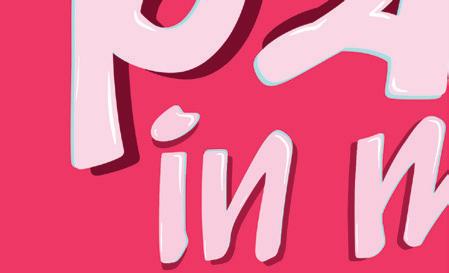













Probably. I guess you could have thought of Mary Todd Lincoln in a hoop skirt and a bonnet. But chances are, Hillary Clinton, Jacinda Ardern or Angela Merkel came to mind. All three have spent much of their political careers donning the unofficial uniform of the professional woman.
The pantsuit, the legendary pairing of slacks with a matching blazer, was first developed after the First World War during a boom in more masculine clothing for women. They didn’t truly catch on until the sixties, when Yves Saint Laurent created an androgynous take on a tuxedo brilliantly named, “Le Smoking.” A title I’ll always be mad that I didn’t think of first.
Through the seventies and eighties, pantsuits rose in popularity with women in business, commonly called “power suits.” But for female politicians, dresses and skirt sets remained most popular.



During her tenure as Prime Minister of the United Kingdom, Margaret Thatcher was rarely seen in anything but a mid-length skirt and a tightly buttoned jacket. Her outfits were far closer what the Queen was wearing than they were to Melanie Griffith’s executive chic in Working Girl.
For many years, women were banned from wearing trousers on the United States Senate floor. The ban was finally lifted in 1993 when two female senators dared to wear pants and started a trend amongst the female staff. Martha Pope, the Senate’s Sergeant at Arms, was the person to amend the rule, allowing women on the Senate floor to wear trousers… as long as they wore a jacket.
The pantsuit had long been ready for its political moment, and here it was.
During her tenure as First Lady, Hillary Clinton softlaunched her pantsuit era by sprinkling in a few pairs of trousers with more traditional First Lady-ish dresses. By the time she was elected as a Senator in 2001 she was closely associated with the pantsuit, and during her 2016 presidential run she was basically never seen without one.
The pantsuit provides an opportunity for female politicians to closely mirror the attire of male politicians. Visually, it makes some headway in leveling the playing field.
Sarah Pallett, MP for Ilam, says that for male politicians, the suit is utterly dependable. “It’s dead easy, I mean, you know, they just have to have a dark suit, a shirt, and a tie. And that’s it, they’re done… and that’s not true of women.”
In her political work Sarah wears both pantsuits and dresses, and she has a favourite skirt suit. She says that in Aotearoa politics, “there is a dress code which is broadly ‘business attire’,” describing the typical clothing choices as “smart but not formal-formal.”

Sarah says that female politicians are under far greater scrutiny than male politicians regarding their appearance. “Having to focus on what we’re wearing adds another job for us to do before we get out and start work in the morning – which doesn’t cut into our work time, it cuts into our personal time.”
She mentions a 2017 interview with Hillary Clinton, in which Clinton stated that she had spent six hundred hours – twenty-five days – on hair, makeup, and clothing. Sarah says that those days don’t come out of Clinton’s work hours, so “she has to absorb that extra time into her personal time – potentially downtime, potentially family time.”
The reliability of the suit, and the expectation of minimalto-no makeup, means that male politicians always have a little more time to themselves – a resource already in short supply in political work.
“It’s something that we have to think about that our male counterparts don’t.”
The pantsuit is sometimes considered the safe option for women in politics – but whatever it is you choose to wear; it’s going to get criticised.
British tabloids have a history of slapping slangy headlines over images of female politicians. When Theresa May became the British Prime Minister, the



Sun’s front-page headline read “HEEL, BOYS,” referring to May’s favourite leopard-print heels.
The following year, when she met with Nicola Sturgeon regarding the UK’s departure from the EU, the Daily Mail chose the headline “Forget Brexit, who won Legs-it!”
Just before Kamala Harris was about to be sworn in as Vice President, she appeared on the cover of Vogue. Her clothing was a little unexpected: she wore casual blazer and slim trousers which didn’t match, along with a pair of Converse.
Kamala had dressed herself, but expected the photo to appear inside the issue, not on the cover. The look was too approachable for a Vice President – the first-ever female Vice President.
Alexandra Ocasio-Cortez faced a similar issue, in the other direction: she was lambasted for wearing a $1,000 suit on the cover of Vanity Fair, accused of flaunting wealth while promoting socialism. AOC didn’t even own the outfit in question; it was lent to her for the shoot.
Sarah says people are “not kind” when discussing the appearances of female politicians.

“They’re not focusing on, ‘oh hey, look, such-andsuch looked awesome today’,” Sarah says.

“It’s always ‘oh my gosh, she’s wearing the same suit, she’s wearing the same shirt, she’s wearing the same dress’.”
The pantsuit is comfortable and classic, which has helped it become so popular, but its most important function is its invisibility: since it closely replicates the ubiquitous suits worn by male politicians, it asks viewers and listeners to focus on the political work being done – like they focus on for men.





“The standard is not the same for men as it is for women. But this is true in so many areas,” Sarah says. “We do need to move away from an atmosphere where we are critiquing and criticising women for things that are wholly superficial.”
While fashion can tell us a great deal about lawmakers and their intentions, the unfair scrutiny placed on female politicians needs to end. AOC’s lipstick got more media coverage than the details of her Green New Deal submission, and Theresa May’s heels were far less crucial to course of world history than her Grenfell response was.
“Society and the media do make it a focus. And I would just love it if that changed,” Sarah says. “We’ll get there.”








































































Just like how Michelangelo’s Sistine Chapel fresco tells the biblical story of Earth and Heaven’s creation through to the Great Flood, many contemporary conflicts are accompanied with a distinct soundtrack that tells their story. These collections of songs artistically amplified awareness, united people over a common cause, and brought solace to those hurt by some of humanity’s darkest displays. Without further ado, here is a look at the crossroads of music and martial strife through two key political conflicts, those being the Vietnam War and the Troubles.





The Vietnam War began in 1955 following the first Indochina War which resulted in the division of the nation into North and South Vietnam. North Vietnam (consisting of the Viet Cong and People's Army of Vietnam) envisioned the country reuniting under communism. The politically diametric South fought back with the support of the United States, who took on a prominent role in the war during the early 60s onwards.
One of the earliest songs of prominence associated with the Vietnam War was Bobby Bare’s cover of Detroit City A country classic from 1963, Bare’s opening refrain of “I wanna go home, I wanna go home” resonated with soldiers stationed away from home. The song itself is actually about southerners moving north to more industrial cities and missing the rural lifestyle. Regardless, the sentiment stuck as just months after the song’s release, roughly 16,000 Americans found themselves in the midst of war longing for home.
Also in 1963, rock and roll hall of famer Bob Dylan came out with his sophomore album The Freewheelin’ Bob Dylan, which featured the aptly named Masters of War While intended to be a protest to the nuclear arms race occuring in the 60s, the timing of its launch coincided with the United States getting increasingly more involved in Vietnamese affairs. Dylan described the track as “a pacifistic song against war… [and] not an anti-war song.”
Come 1965, The Animals had put out a pair of singles that were exceedingly popular amongst American forces –House of the Rising Sun and We’ve Gotta Get Out of This Place. Just like Detroit City, these tracks possessed no references to Vietnam but provided troops with fitting lyrics to sing together and some bluesy buoyancy to
enjoy. Porter Wagoner’s Green Green Grass of Home also scratched the right itch for homesick soldiers, especially those more inclined to America’s trademark country twang.





Barry McGuire’s grumbly song Eve of Destruction spends no time beating around the bush topically, opening with “The Eastern world, it is explodin’ // violence flarin,’ bullets loadin’ // you’re old enough to kill but not for votin’.” The song’s criticism of the States’ involvement in the war led to it being banned off several American radio stations.












When it comes to the heavy hitters associated with the war, Fortunate Son by Creedence Clearwater Revival is a rock and roll anthem that passionately stands against America’s involvement in the Vietnam War. John Fogerty claims the song was written in anger at the prospect of being drafted to fight without reason and completed in just twenty minutes. Speaking of such tracks, I can’t go without mentioning Edwin Starr’s War, where he asks the timeless question, “what is it good for?” Few songs here beat the energy of this track with its layered chants, horn sections, and Starr’s commanding showmanship.
Come 1971, Marvin Gaye rocked the boat with one of the greatest albums to this day in What’s Going On. A soul concept album, What’s Going On follows the return of a Vietnam veteran and grows to learn of the hatred and injustice that has brewed in his home country while he’s been away. The titular track sees Gaye really hone his flower power with vocals silky as anything. As an album, Gaye provided the American people with a collection of classics to embrace pacifism over. The United States eventually withdrew from the Vietnam War in 1973, which concluded in 1975.


The Troubles mark a thirty-year period in Northern Ireland where Protestant unionists and Roman Catholic nationalists had a violent dispute over whether the country should remain part of the United Kingdom or join the Republic of Ireland. This nationalistic feud began in 1968 and resulted in the death of 3,532 people, half of those being civilians.
Where the Vietnam War musically found its roots in country music, the Troubles were initially grounded in folk music. In 1971, The Wolfe Tones released The Men Behind The Wire, a guitar ballad describing raids done by British soldiers where they sang “armoured cars and tanks and guns, came to take away our sons.”



The following year rock band Wings came out with Give IrelandBacktotheIrish, written by Paul and Linda McCartney. This track questioned Britain’s involvement in Irish affairs, asking them to make Ireland Irish once again in response to the events of Bloody Sunday, where British soldiers killed 26 unarmed civilians at a protest march in Derry. Phil Coulter’s The Town I Loved So Well continues this conversation as he reflects on his childhood growing up in Derry and how it is now shrouded in violence and military activity.
While living in Belfast, Ireland, The Police’s Sting observed the hunger strikes taking place and wrote Invisible Sun, the lead single to the band’s penultimate record Ghost in the Machine. Featuring an addictive synth-loop, Sting had the following to say on his inspiration for the song: “I wanted to show some light at the end of the tunnel. I do think there has to be an ‘invisible sun.’ You can't always see it, but there has
to be something radiating light into our lives.”
Circling back to the Bloody Sunday massacre, Irish band U2 opened their 1983 album War with Sunday Bloody Sunday Here, Bono and the band detail their disgust with the state of their home country, singing “Broken bottles under children’s feet // Bodies strewn across the dead-end street.” New Year’s Day also features some pressing lyricism such as, “And so we're told this is the golden age // And gold is the reason for the wars we wage.”
In 1988, The Pogue’s released Street of Sorrow / Birmingham Six. Personally, I’d never listened to Irish folk punk before writing this, shocking I know, but as far as odd genre bending goes, it wasn’t as off putting as I had anticipated! The first part of the song features Shane MacGowan describing the pain and hurt that Irish civilians were experiencing as violence became an ever-increasing normality too close to home. The second part picks up the energy, incorporating more softpunk elements. Here the band stands in solidarity with the Birmingham Six who were a group of Irish men tortured to confess and wrongly imprisoned for the 1972 Birmingham pub bombings that killed 21 people.
Finally, Zombie by The Cranberries. Not only did Zombie set the new gold standard when it came to songs made in revolt of the Troubles, but it also cemented the Cranberries’ legacy in alternative rock by just their second studio album. With her yodel-style trembles, Dolores O'Riordan delivered one of the most unique and haunting vocal performances to hit the mainstream and an anthem for the ages.



Your ideal weekend would be spent…
Outdoors, hitting up a beach or climbing up the Port hills.
Hitting up the Foundry for a pint.
Learning a new skill like skating or sewing. Getting into a drunken debate.
Quick! Your friends would describe you as…
















Strong-minded, helpful, and kind. Bit of a loose unit tbh.
Loving, nurturing and thoughtful. Opinionated, strong and smart.
You have been picked for Canta’s Lucky Dip! You are at Rollickin' gelato with your smokin’ hot date, the most important topic of discussion for you is…
Asking what the other person is passionate about, their hobbies and interests. Discussing problematic Love Island couples.
Rating our favourite childhood ice-creams. Your feelings on the gender pay gap.
Fill the blank: If _____ was a subject at school, I would absolutely slay it.
Giving back to the community. Teaching someone how to vortex a drink the fastest way possible.
Naming as many cartoon characters as possible in under a minute. Yelling at people.
Arghhhh it’s your rotation on the flat dinner schedule tonight and you don’t have much time. Your signature dish to whip out is…
Vegetarian nachos. Yum as and caters for everybody.
Just don’t eat. Or maybe we could make toast.
Spaghetti Bolognese. Such a classic, you literally can’t go wrong!
Roast Chicken. Easy, straightforward and hearty.

Go for a cutesy study sesh at the Central Library, level 4 obviously so we can chat.
Ahhh she’ll be right, I’ll just do it later!


Get heaps of cute stickers and make flashcards.










Make a detailed plan outlining the start to the finish of the project.





Your flats hosting a dress up party and you are put in charge of deciding the theme, what do you pick?
Dress up as your favourite animal! Mullets. Best mullet at the party wins a box.
Through the decades. I would love to wear some of my vintage 80s clothes!
Old school uniforms. Can’t go wrong.
When a new Canta mag hits the stand, you are most excited for the...
Obvi the Climate edition. Sex edition, duh
Mostly a's - “Okay boomer”
Nostalgia edition, hands down. The Issues issue…love me some drama.
The Greens politician Chlöe Swarbrick went viral for her trendy response after being interrupted by a lawmaker amid her climate change speech. You are forward thinking, community minded and kind, with a serious love for the environment and animals.

Mostly b's - “Spread your legs!”
COVID-19 response minister, now PM, Chris Hipkins took over the internet when he famously exclaimed to “spread your legs” during a 1pm COVID press conference during the Delta outbreak in 2021. A classic class clown, you don’t take life too seriously; have a shower bevvy and have a bit of a laugh…. she’ll be right.
Mostly c's - Baby Cam
In 2017, Trevor Mallard, a New Zealand’s House of Representatives speaker, cradled and fed Tāmati Coffey’s baby Heeni whilst in the middle of a debate. You are a softie with a big heart and lover of all things nostalgic. There is nothing you love more than reminiscing on your childhood, eating your old favourite snacks and binging your favourite childhood cartoons!
Mostly d's - “My Husband is Samoan…so Talofa.”
During the first TV debate between Jacinda Ardern and Judith Collins in 2020, the National Party leader was asked to comment on what she would do about high school students being forced to leave school and work to support their families. Collins responded with the no infamous catch phrase “my Husband is Samoan…so Talofa!”. Opinionated and sassy, you know exactly what you want and where you are going!


ACT - Will Young, Season 9
Season 9 of Love Island didn’t give us a lot if I’m honest. It wasn’t a particularly thrilling season and being in the winter, it put us all into a Love Island-induced coma from excessive content. But it did deliver to the world one weird yet loveable man - farmer boy Will Young aka David Seymour’s twin.
Not only is the physical resemblance uncanny, but their personalities are eerily similar. Funnily enough, both have back and spine issues from carrying their respective Love Island season and political party almost entirely on their own.
Will probably isn’t someone you’d introduce to your parents, nor is David necessarily someone you’d want repping the country on the very serious world stage but hey, they sure do keep us entertained.
Just like our current governing party, Jake and Libby started out strong, being coupled up from the outset. Cracks started to show in the aftermath of ‘movie night’ where it was revealed that Jake told other contestants that Liberty was messy and he, “didn’t want to rip her clothes off.”
In the New Zealand political realm, the derailment from Casa Amor could be similar to the repercussions of the Covid-19 pandemic, even years later. Labour’s response to issues surrounding Covid was reassuring us with the classic “team of 5 million” line. Jake’s equivalent to Libby’s concerns was reminding her, “but you’re my girlfriend.” Eventually though, both statements landed on deaf ears.
Labour is facing the lowest polling numbers in 20 years, with an interim Prime Minister trying to fill the shoes of Jacinda while their members in Cabinet are dropping like flies. It didn’t work out for Jake and Libby, but maybe Labour will pull it off?
“Why yer asking her dat?!”
Ah, classic Maura Higgins. An honest patron of the cold hard truth, both Maura and the Greens party have more in common than one might think. Neither are afraid to tell people what they really think and end up in a little more drama because of it.
Turns out the Greens are deeply honest, even about their own colleagues. The entire ‘wrong group chat’ debacle, where Chloe Swarbrick was called a “cry-baby” by someone in her own party, was a lesson in what happens when honesty isn’t always the best policy - something Maura never learned either.
Easily the most recognisable and most successful islander to come out of the villa, Molly-Mae is the face of Love Island. National have held office in New Zealand longer than any other political party with 47 years under their belt. Even though Molly-Mae is finished with her time in the villa and National weren’t elected in 2020, they’re both still hold a lot of power and respect. It’s a big thing to liken Molly-Mae to a political party, but honestly this list would not be complete without her, so here we are.

The New Conservatives Party. Nobody hears that much from them, being a minority party and all. If I had to liken them to a Love Island icon, I would have to say they’re giving very much Lucinda Strafford vibes. A little ditsy, a little confused, a little behind, but still likeable to the right audience. And if nothing else, the New Conservatives keep New Zealand media in business and the general population entertained.







Hailing from Sussex, Lucinda’s dialect resulted in some infamous quotes like “rEEEally” and “you’re jOOOking.” Something the New Conservatives are surely thinking to themselves as they sit in Parliament.
Te Pāti Māori - Whitney Adebayo, Season 10
Whitney is the best thing to come out of this seasons’ Love Island. That girl speaks her mind and for that we are forever grateful. She knows what she wants and goes after it, much like Te Pāti Māori. Ready and willing to call out any bs from other political parties, Te Pāti Māori are taking a leaf from Whitneys’ book.
Whitney is always standing up for her friends (unless that friend is Ella in which case, she’s gonna call you the most selfish person she’s ever met in front of all the girl islanders) but she stands up for herself too. Te Pāti Māori advocate for people and their party and to quote Whitney, “It’s giving growth.”
The Opportunities Party - Leah

There's some people on Love Island that are just… there. The ones that don’t get a lot of screen time, who aren’t necessarily bad, but maybe just a little bit bland for Love Island. One of this years’ bombshells, Leah Taylor, was one such character. Not much of a personality from that one, and TOP give off similar vibes. There’s some good policies for sure, but people don’t have a lot of time for them as they’re so unlikely to ever get a majority vote in an election.
Not to say Leah isn’t popular - her Instagram following jumped from 38k to over 200k during her time in the villa - but clearly the public didn’t think she was a good fit for the island. Here’s to hoping the public aren’t as ruthless towards TOP.
From their infamous ‘That’s Not Me’ rap to shaving each other’s initials into their pubes, Kem and Chris were truly inseparable. Even though Kem ended up winning the season with Amber Davies, their bromance was the true W from the show. On a seemingly unrelated but still very relevant note, the bromance is not too dissimilar from Winston Peters and voters aged over 65.
While Kem and Chris’ romantic relationships were on the rocks, their friendship kept them on the island. Retirees are to Winston Peters what Kem is to Chris - keeping their career afloat when they probably should’ve gone home a while ago.













you, me, and a







































GuacSoc is a social club about all things guac. We’re about meeting new people, sharing some kai, and also enjoy getting lost in the sauce.

Join our club and we’ll not only show you how to tell if an avocado is ripe and ready, we might also let you guess the secret GuacSoc guacamole recipe.







We’ve got some big plans before the end of the year; collaborations with the other social clubs, a Guactail night, or maybe even a Guac off.



You guys can get involved by following us on Instagram or Facebook. If you have any issues then send us a DM or if you’re lucky enough to find us around campus then come ask us some questions in person.


Finally, always remember, when life gives you avocados, make guacamole.
Cheers, Aiden.









Fully funded public transport up to 30
Fully funded healthcare up to 30



$5K Universal Savings Boost at 18
"We want to create a fairer future for everyone, and that starts with investing in young people."
Vote #Raf4Ilam
Authorised by H. Cargo, 90 Crawford St, Dunedin






Ruby
Nickname: the Haus




Dustiest Moment: Getting her tits out at Symrose on Instagram live

Guilty Pleasure: Holding her vag when needing to pee
Sophia
Nickname: Sloppia
Dustiest Moment: Vomiting in mums fav coolie bag on the highway
Guilty Pleasure: Large Big Mac combo with extra tomato sauce
Pearle

Nickname: Beanz
Dustiest Moment: Hot chips viciously cut their way back up her throat the morning after a big night, resulting in bloody vomit
Guilty Pleasure: Putting Snapchat filters on everyone when we are having conversations





Tessa
Nickname: Bong Lord
Dustiest Moment: Flashing the MONO line her tits and everyone thinking it was Pearle
Guilty Pleasure: A durry for breakfast
Mia Nickname: Townshlay
Dustiest Moment: Vodka tampon
Guilty Pleasure: Being on her learners and taxing rides
Holly Nickname: H lew
Dustiest Moment: Got marched out of the last ever MONO by two security guards for trying to set off the fire alarms:((
Guilty Pleasure: A durry for breakfast
Lucy
Nickname: Coco

Dustiest Moment: Considering Eminem as a father figure
Guilty Pleasure: Using blue hair dye to tone blond hair and ending up with blue hair



Willow Nickname: Willy
Dustiest Moment: Pissing off of a balcony at her 21st
Guilty Pleasure: Being mean to men when drunk


















What would you like baby Annick to know?

First year Uni is hard and weird. I think it’s a time to find your feet. Not every thing is going to turn out like you imagine it would. Fresher year is the time with your explore things and find your path. For some people it will click immediately for a lot of others it will take a wild. Give everything a good go: Study and social.
Tell us a bit about your fresher self








I did not know what I wanted to do. I thought I wasn’t good enough for lots of things. I first wanted to be a tourist guide and I was enrolled into a polytech institution to study that. But during the last few months of high school I started to really doubt this was my path. I also kind of knew I would not have the patience to deal with grumpy clients. Anyway I thought I would try law and also since I really enjoyed reading Russian novel, I enrolled in Russian languages. I managed well in year 1: I did not like law but I manage well. I was good at it even if it was really boring. So I kept going with it into year 2.
What was your biggest fresher fail?
I asked the constitutional Lecturer a really dumb question in front of the entire class (1200 students) and everyone laugh at me…. It was dumb really: I don’t even remember what it was but I did know then that it was dumb….


Describe your best first year memory




I studied in Nancy and it’s a very old University. The architecture was amazing. Just being there was making me clever! The environment was so conducive to learning. That was my overall great memory of first year.

The Canterbury Rams have a huge reason to be celebrating for the rest of the year. They successfully managed to beat the Auckland Tuatara on opposition home soil 93 – 82.


Key players in the match were Corey Webster, a former Tall Blacks guard and Tevin Brown, an American guard. The team and their coach, Judd Flavell, was no doubt ecstatic with the win. Successfully winning the NBL, a win that hasn’t happened since 1992.

It has been a long, uphill battle for the team to get to this point. After leaving the NBL in 2008, being replaced by the Christchurch Cougars before they withdrew due to the 2011 Christchurch earthquakes. This win for the side has proven to all the teams in the NBL and their fans that they have made a comeback, and they sure as hell won’t be stopped.
Huge shout-out to Tim Smith, one of our beloved feature writers who is the Director of Scouting for the team.



Our Football Ferns made history in the opening match for the world cup which was held at Eden Park.
With a crowd of 42,137 people it was a record set for attendance for a football match in New Zealand and women’s sports events. But that isn’t even the crazy part. Hannah Wilkinson scored the goal of the century for the football ferns, earning them their first goal and their first win in a world cup match.
The game was one to watch with the Football Ferns putting pressure on the Norwegians from the start. After half time when Hannah Wilkinson made history scoring the side did well to keep a hold of the win.
Although the Football Ferns didn’t make it through and were knocked out of the world cup. They can rest easy knowing they have made history here in New Zealand and did the country incredibly proud.
Someone tell Eddie Jones he never had a chance…
I couldn’t think of anything worse than saying on live TV that the whole country of New Zealand should be scared of your side in the up-coming match, and then losing 38 – 7. The Australian side didn’t even hit double digits.



In front of a massive crowd of 83,994, the New Zealand team delivered, scoring six tries and caused havoc for the Wallabies who were definitely a step behind the All Blacks. With Scott Barrett definitely taking man of the match for not only his playing but for shushing Wallabies half-back, Nic White and taking out Tate McDermott in a hard hitting tackle.
Ardie Savea captained the side to victory in the most modest, humble way. In an interview with press after the match, he was only looking to the next match and seeing where the side could improve.
This win follows the All Blacks incredible win over South Africa for the Freedom Cup. Both of these results are promising especially considering the Rugby World Cup is just around the corner.



2023 seems to be the year of the World Cups. On that note, the Silver Ferns are currently overseas in South Africa attempting to defend their world cup title.
The side are currently through to the next stage of the Netball World Cup after cleaning up the competition in pool play, topping their pool. Their games have also been incredibly strong with their first game being a 76 – 27 win to the kiwi side against Trinidad and Tobago.







Their second match against Uganda was a nail bitter till the end with a proper challenge put up from the Ugandan side. Luckily in the second half the Silver Ferns managed to pull themselves together and take the win with just ten points in it, 54 – 44.
Even though the side won their last match against Singapore 80 – 19, they are still always looking for ways to improve. Ameliaranne Ekenasio, captain of the Silver Ferns knows her team is capable of more, regardless of how well they are doing.
This World Cup is definitely one to watch, especially with the possibility of facing the Australian rivals the Diamonds again in the final.




As Canta’s longest running segment we play matchmaker and pair up two lucky UC students to hopefully hit it off on a blind date and record their experiences. Sign yourself or a mate up on our website for some free Rollickin and lovin’.








Here are the raw unedited results of this week’s lucky dippers…




I'm not going to lie, I was initially entered into Lucky Dip by my flatmates as a joke. Sadly the dire state of my underwhelming love life at the moment, is absolutely no joke. So when I saw that DM from Canta, boy was I FIZZING at the opportunity for a hot date. And for an ice cream of course, but that's not really the main course here is it?



After indulging in a few too many G&Ts on my Saturday night, I washed off the dust, threw back some painkillers, and got ready for my hot date. Not gunna lie, I was actually a wee bit nervous. Wow, my date was already giving me butterflies!! Luckily I had the girls to gas me up and I was on my merry way, pumping some Rihanna tunes to hype me up.
To my surprise I was actually on-time for something! The lovely Rolickin’ team told me to head on upstairs and they'd send my date on up. At least I don't mind having to wait, a bit of anticipation is kinda hot - you know what I'm sayin'? With each set of footsteps coming up the stairs my excitement grew. However, this excitement slowly turned into nerves as the minutes ticked by. I eventually found myself sitting all alone in a room full of couples - not the vibe. I stayed optimistic and thought maybe my date was just running a wee bit late. BOY was I wrong.
After waiting a solid 30 minutes I finally decided fuck it, I deserve a brownie. I sat my ass back down upstairs and got some interesting looks from the swarm of happy couples around me - joy.... Whilst smashing back my delish brownie I thought to myself this must have been a sign from a greater power, telling me it was time to date myself instead. Self-love comes first! So naturally I went home for a well-deserved cone and a wank. No date will ever compare to my satisfyer anyway.
Turns out my date was in the hospital. Still, a pretty shit excuse if you ask me. Know your worth ladies!!
P.S. in all seriousness I hope my hot date is okay, I will forever wonder what could have been... You missed out xo
The bro didn’t show up.









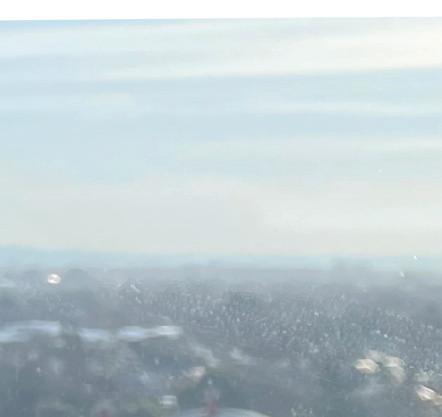








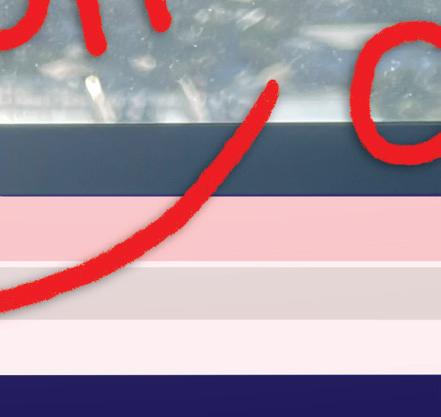


































Jul 23 Aug 22
Hello, you sexy feline beast! Avoid letting your ego grow too big this month, there is a time and place where having a big head is a good thing, and this isn’t it. Like, come on, use your charisma to promote important shit rather than your wannabe influencer handle
Oct 23 Nov 21
Your passion is undoubtedly strong. However, I do want to warn you… please put an end to your personal vendettas. Not everyone wants to hurt you, Scorpio; sometimes a smile is just a smile.
Aug 23 Sep 22
Stop being a perfectionist! A fine toothcomb is good for nothing but nits. Give it up, Sherlock. Not everything needs a magnifying glass. Although, save it for finding your lost marbles – bitch, pick them up rn.
Nov 22 Dec 21
Go on an adventure, Sagittarius! You may discover yourself fantasising about venturing into uncharted territory like the kitchen pantry or the obscure nooks of your closet because the desire to explore will be at an all-time high. Who knows what hidden gems you'll find.
Jan 20 Feb 18
Please, find some new music – we are sick of hearing the same two songs blast from your run-down car. This is the month of new things! It's okay to eat food that isn’t yellow and fried x
Apr 20 May 20
Stop being so stubborn, bro, it's easier to go with the flow! Don’t forget, issa process, and yes, it may be harder than getting a consensus in Congress, but it do be liberating.
Sep 23 Oct 22
It's admirable that you want your personal politics to be balanced, but don't try to win over everyone; always keep in mind that a friend to all is a friend to none! So, boo, you do you! People pleasing is old behaviour, babe x
Dec 22 Jan 19
Your ambition and tenacity, Capricorns, will propel you up the career ladder. Just watch out for trading your morals for success. The best victories are ones where you stay true to yourself, so slay!
Feb 19 March 20
This month, Pisces, your intuition will help you navigate the chaos of your life. Stay strong, and you'll develop a keen sense of how to handle challenging circumstances with ease. I'm so incredibly proud of you!
May 21 Jun 20
Gemini, you are so fun, so clever, so independent! Your grades are popping off. You have been so social. Lately, I have no notes for you. Keep doing you, you got this, I love you, babes!
March 21 April 19
Your fiery passion for justice will pop off this month. So, embrace your leadership skills, stand up for what you believe in and lead some positive change in your community.
Jun 21 Jul 22
Do not engulf others in your emotional tides, Cancer, which may ebb and flow like the sea. Put on your sailor's hat and gracefully navigate your emotions. Being sensitive doesn't have to ruin your relationships, however!



































If you wish to make a complaint or offer some feedback, please email ‘editor@canta.co.nz.’

































